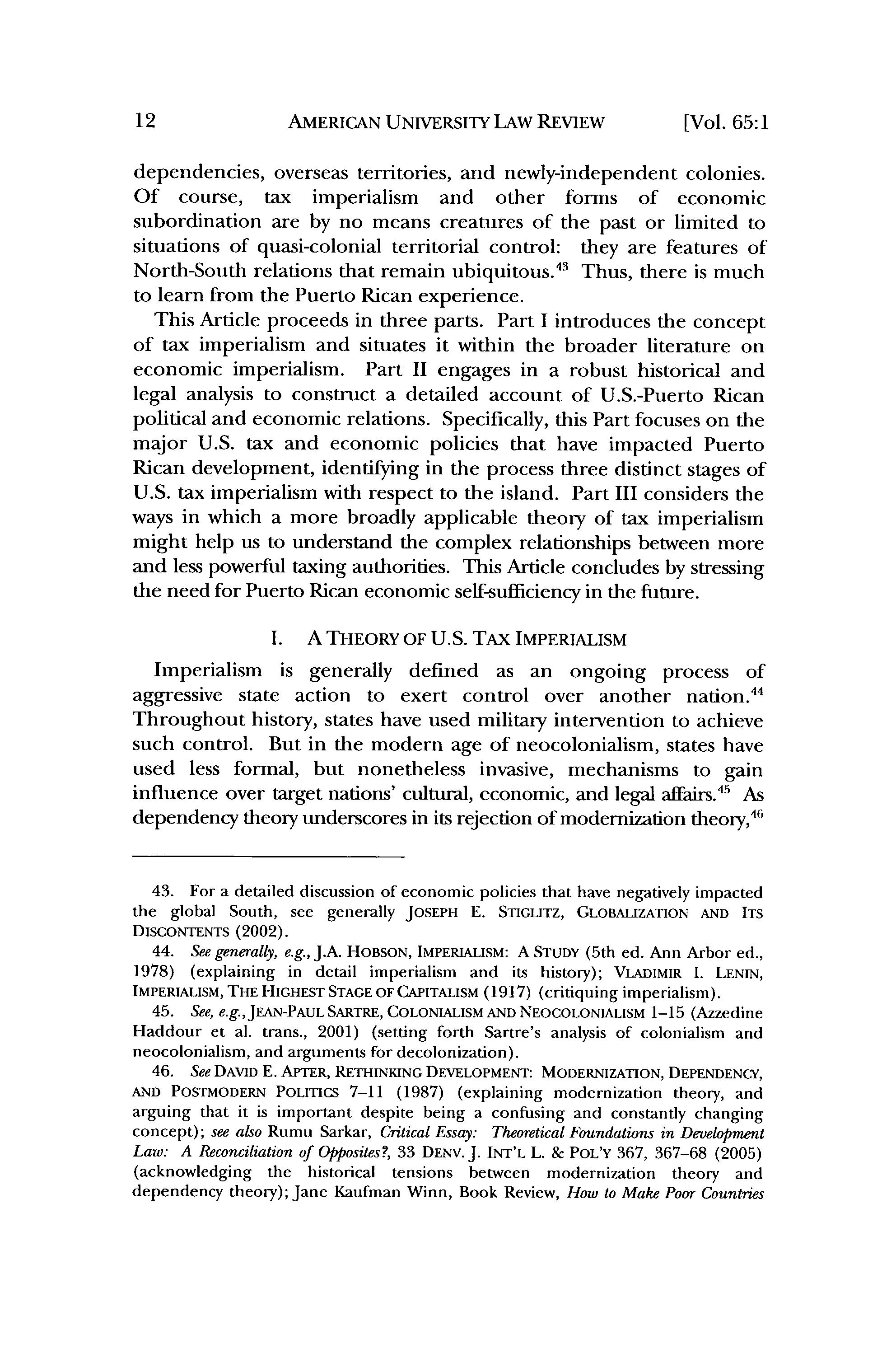
70 minute read
I. A Theory of U.S. Tax Imperialism
12
AMERICAN UNIVERSITY LAW REVIEW [Vol. 65:1
dependencies, overseas territories, and newly-independent colonies. Of course, tax imperialism and other forms of economic subordination are by no means creatures of the past or limited to situations of quasi-colonial territorial control: they are features of North-South relations that remain ubiquitous." Thus, there is much to learn from the Puerto Rican experience.
This Article proceeds in three parts. Part I introduces the concept of tax imperialism and situates it within the broader literature on economic imperialism. Part II engages in a robust historical and legal analysis to construct a detailed account of U.S.-Puerto Rican political and economic relations. Specifically, this Part focuses on the major U.S. tax and economic policies that have impacted Puerto Rican development, identifying in the process three distinct stages of U.S. tax imperialism with respect to the island. Part III considers the ways in which a more broadly applicable theory of tax imperialism might help us to understand the complex relationships between more and less powerful taxing authorities. This Article concludes by stressing the need for Puerto Rican economic self-sufficiency in the future.
I.
A THEORY OF U.S. TAX IMPERIALISM
Imperialism is generally defined as an ongoing process of aggressive state action to exert control over another nation." Throughout history, states have used military intervention to achieve such control. But in the modern age of neocolonialism, states have used less formal, but nonetheless invasive, mechanisms to gain influence over target nations' cultural, economic, and legal affairs." As dependency theory underscores in its rejection of modernization theory,"
43. For a detailed discussion of economic policies that have negatively impacted the global South, see generally JOSEPH E. STIGLITZ, GLOBALIZATION AND ITS DISCONTENTS (2002). 44. See generally, e.g., J.A. HOBsoN, IMPERIALISM: A STuDY (5th ed. Ann Arbor ed., 1978) (explaining in detail imperialism and its history); VLADIMIR I. LENIN, IMPERIALISM, THE HIGHEST STAGE OF CAPITALISM (1917) (critiquing imperialism). 45. See, e.g.,JEAN-PAUL SARTRE, COLONIALISM AND NEOCOLONIALISM 1-15 (Azzedine Haddour et al. trans., 2001) (setting forth Sartre's analysis of colonialism and neocolonialism, and arguments for decolonization). 46. See DAVID E. APTER, RETHINKING DEVELOPMENT: MODERNIZATION, DEPENDENCY, AND POSTMODERN POLITICS 7-11 (1987) (explaining modernization theory, and arguing that it is important despite being a confusing and constantly changing concept); see also Rumu Sarkar, Critical Essay: Theoretical Foundations in Development Law: A Reconciliation of Opposites?, 33 DENV. J. INT'L L. & POL'Y 367, 367-68 (2005) (acknowledging the historical tensions between modernization theory and dependency theory); Jane Kaufman Winn, Book Review, How to Make Poor Countries
2015]
U.S. TAx IMPERIALISM IN PUERTO RICO
13
blame for the plight of developing nations ought to be assigned to the powerful states, whose imperialist interventions create dependencies."
Classic works in the social sciences reveal how powerful states, such as the United States, exert control over weaker states in order to extract resources and advance their own economic interests. Scholarship has focused on economic imperialism's negative effects on labor and infrastructure within developing regions," and on the role of states, multinational corporations, nongovernmental organizations, and other actors in advancing the interests of powerful regimes." Drawing upon the closely-related world systems theory,o these works tend to show that imperialism by its very nature poorly integrates developing nations into the global market, leaving them suspended in a state of dependency, with only a peripheral role to play in the world economy."
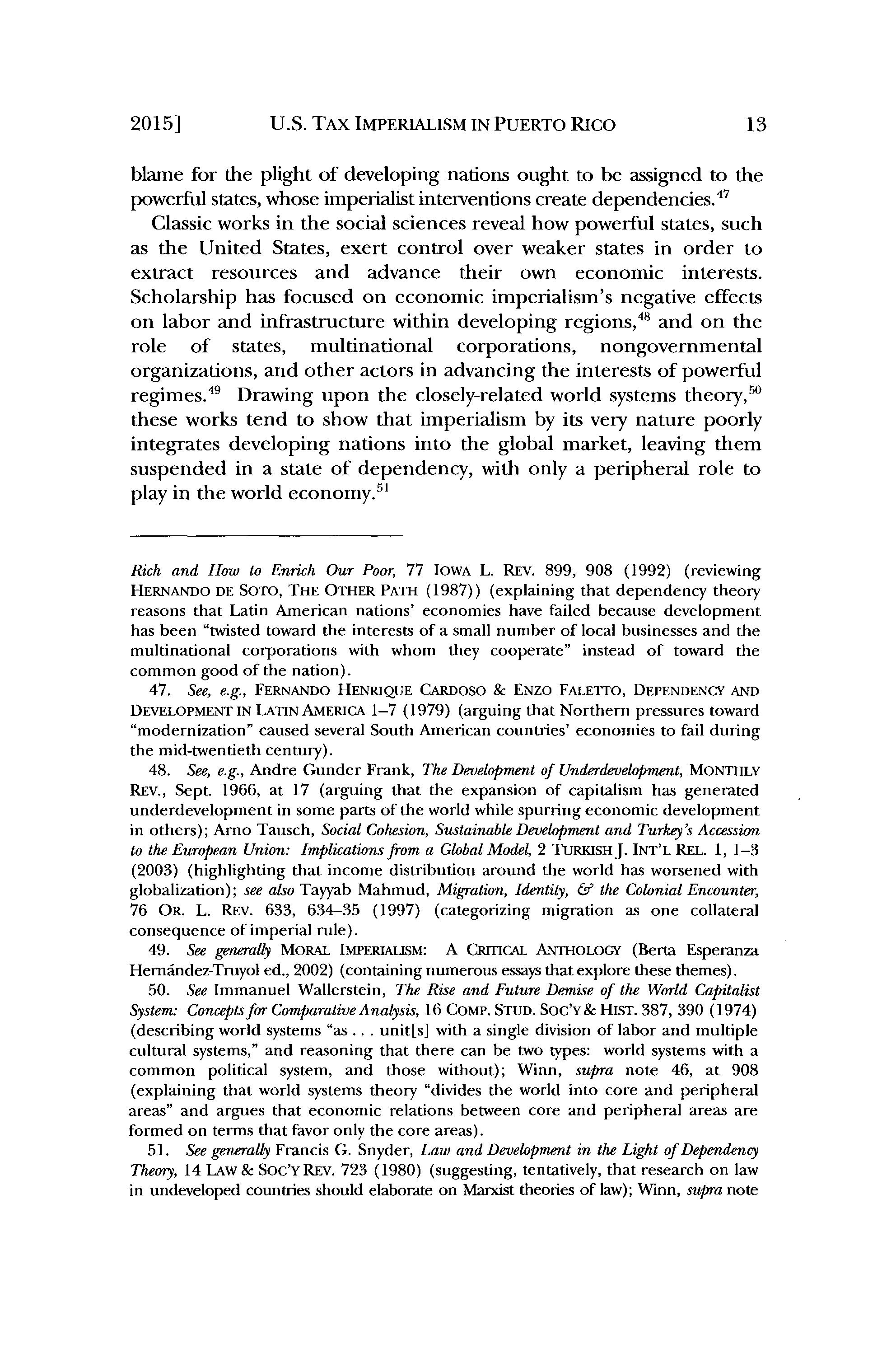
Rich and How to Enrich Our Poor, 77 IOWA L. REV. 899, 908 (1992) (reviewing HERNANDO DE SOTO, THE OTHER PATH (1987)) (explaining that dependency theory reasons that Latin American nations' economies have failed because development has been "twisted toward the interests of a small number of local businesses and the multinational corporations with whom they cooperate" instead of toward the common good of the nation). 47. See, e.g., FERNANDO HENRIQUE CARDOsO & ENzo FALETTO, DEPENDENCY AND DEVELOPMENT IN LATIN AMERICA 1-7 (1979) (arguing that Northern pressures toward "modernization" caused several South American countries' economies to fail during the mid-twentieth century). 48. See, e.g., Andre Gunder Frank, The Development of Underdevelopment, MONTHLY REV., Sept. 1966, at 17 (arguing that the expansion of capitalism has generated underdevelopment in some parts of the world while spurring economic development in others); Arno Tausch, Social Cohesion, Sustainable Development and Turkey's Accession to the European Union: Implications from a Global Model, 2 TURKISHJ. INT'L REL. 1, 1-3 (2003) (highlighting that income distribution around the world has worsened with globalization); see also Tayyab Mahmud, Migration, Identity, & the Colonial Encounter, 76 OR. L. REV. 633, 634-35 (1997) (categorizing migration as one collateral consequence of imperial rule). 49. See generally MORAL IMPERIALISM: A CRMCAL ANTHOLOGY (Berta Esperanza Hernindez-Truyol ed., 2002) (containing numerous essays that explore these themes). 50. See Immanuel Wallerstein, The Rise and Future Demise of the World Capitalist System: Concepts for Comparative Analysis, 16 COMP. STUD. Soc'Y & HIsT. 387, 390 (1974) (describing world systems "as ... unit[s] with a single division of labor and multiple cultural systems," and reasoning that there can be two types: world systems with a common political system, and those without); Winn, supra note 46, at 908 (explaining that world systems theory "divides the world into core and peripheral areas" and argues that economic relations between core and peripheral areas are formed on terms that favor only the core areas). 51. See generally Francis G. Snyder, Law and Development in the Light of Dependency Theory, 14 LAw & Soc'Y REV. 723 (1980) (suggesting, tentatively, that research on law in undeveloped countries should elaborate on Marxist theories of law); Winn, supra note
14
AMERICAN UNIVERSITY 1AW REVIEW [Vol. 65:1
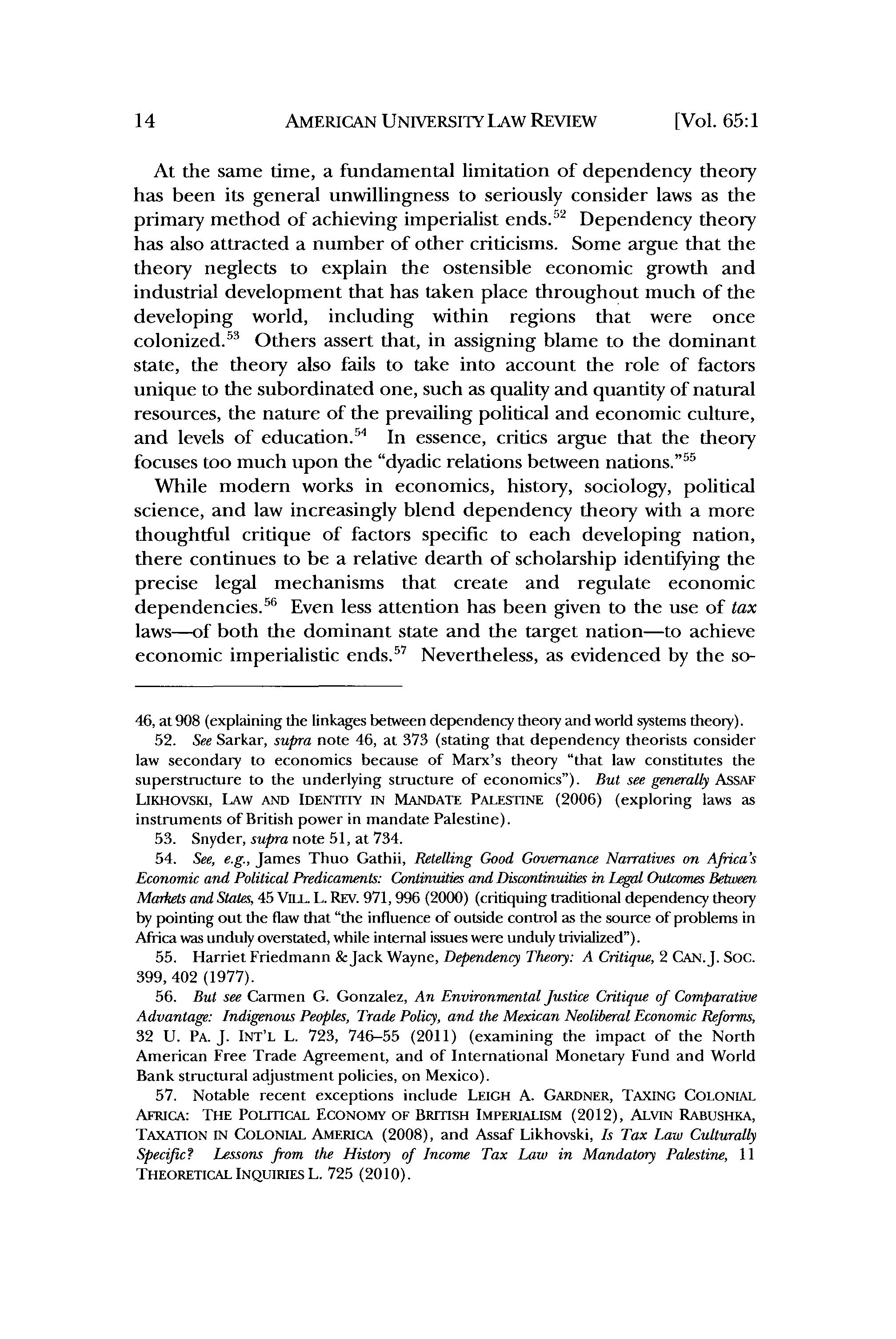
At the same time, a fundamental limitation of dependency theory has been its general unwillingness to seriously consider laws as the primary method of achieving imperialist ends." Dependency theory has also attracted a number of other criticisms. Some argue that the theory neglects to explain the ostensible economic growth and industrial development that has taken place throughout much of the developing world, including within regions that were once colonized." Others assert that, in assigning blame to the dominant state, the theory also fails to take into account the role of factors unique to the subordinated one, such as quality and quantity of natural resources, the nature of the prevailing political and economic culture, and levels of education. In essence, critics argue that the theory focuses too much upon the "dyadic relations between nations."5 5
While modern works in economics, history, sociology, political science, and law increasingly blend dependency theory with a more thoughtful critique of factors specific to each developing nation, there continues to be a relative dearth of scholarship identifying the precise legal mechanisms that create and regulate economic dependencies. 5 Even less attention has been given to the use of tax laws-of both the dominant state and the target nation-to achieve economic imperialistic ends." Nevertheless, as evidenced by the so-
46, at 908 (explaining the linkages between dependency theory and world systems theory). 52. See Sarkar, supra note 46, at 373 (stating that dependency theorists consider law secondary to economics because of Marx's theory "that law constitutes the superstructure to the underlying structure of economics"). But see generally ASSAF LIKHovsKI, LAW AND IDENTITY IN MANDATE PALESTINE (2006) (exploring laws as instruments of British power in mandate Palestine). 53. Snyder, supra note 51, at 734. 54. See, e.g., James Thuo Gathii, Retelling Good Governance Narratives on Africa's Economic and Political Predicaments: Continuities and Discontinuities in Legal Outcomes Between Markets and States, 45 VILL. L. REv. 971, 996 (2000) (critiquing traditional dependency theory by pointing out the flaw that "the influence of outside control as the source of problems in Africa was unduly overstated, while internal issues were unduly trivialized"). 55. Harriet Friedmann &Jack Wayne, Dependency Theory: A Critique, 2 CAN.J. Soc. 399, 402 (1977). 56. But see Carmen G. Gonzalez, An Environmental justice Critique of Comparative Advantage: Indigenous Peoples, Trade Policy, and the Mexican Neoliberal Economic Reforms, 32 U. PA. J. INT'L L. 723, 746-55 (2011) (examining the impact of the North American Free Trade Agreement, and of International Monetary Fund and World Bank structural adjustment policies, on Mexico). 57. Notable recent exceptions include LEIGH A. GARDNER, TAXING COLONIAL AFRICA: THE POLITICAL EcONOMY OF BRITISH IMPERIALISM (2012), ALViN RABUSHKA, TAXATION IN COLONIAL AMERICA (2008), and Assaf Likhovski, Is Tax Law Culturally Specific? Lessons from the History of Income Tax Law in Mandatory Palestine, 11 THEORETICAL INQUIRIES L. 725 (2010).
2015]
U.S. TAx IMPERIALISM IN PUERTO RICO
15
called "Shoup missions" to reconstruct tax laws in-among other places-France, Cuba, and post-World War II Japan, U.S. representatives have directly participated in drafting internal revenue codes around the globe.5 1 Meanwhile, the U.S. Tax Code5 1 itself continues to exert undeniable influence over the investment decisions of U.S. firms and their counterparts in developing nations.o Further compounding matters, the United States wields considerable power over the international tax coordination activities of prominent nongovernmental organizations.' Yet, scholars still do not completely understand the nature and extent of U.S. influence over other taxing jurisdictions; nor do we fully comprehend the collateral and direct consequences of the countless historical and ongoing intrusions. By focusing on a particularly rich case study, this Article helps to fill this void in the social science and legal literature, tackling questions that demand equal parts rigorous tax analysis and deep understanding of U.S. and Puerto Rican history.
The following sections develop a theory of U.S. "tax imperialism," 2 using U.S.-Puerto Rican relations throughout history to demonstrate
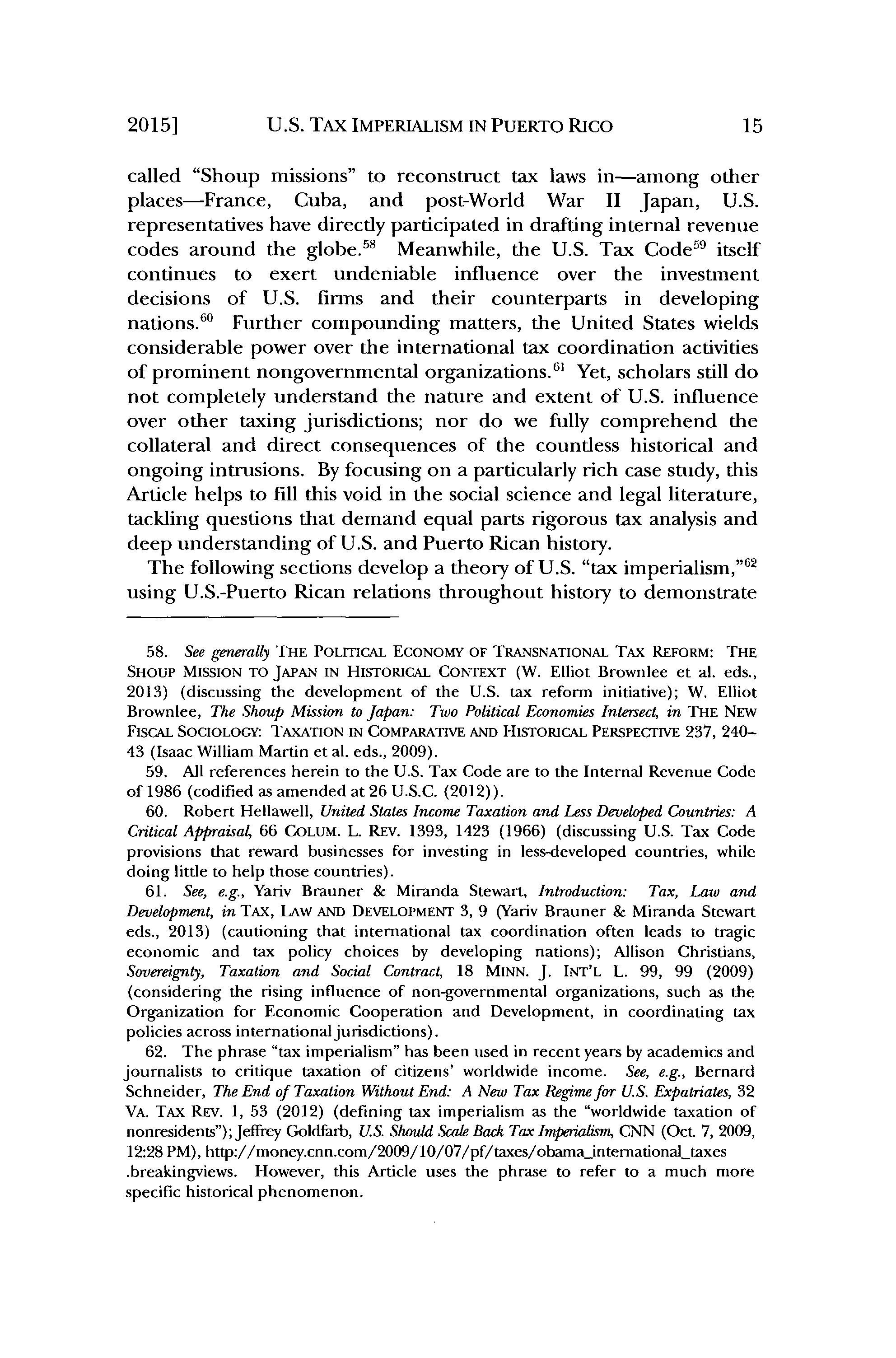
58. See generally THE POLITICAL EcONOMY OF TRANSNATIONAL TAx REFORM: THE SHOUP MISSION TO JAPAN IN HISTORICAL CONTEXT (W. Elliot Brownlee et al. eds., 2013) (discussing the development of the U.S. tax reform initiative); W. Elliot Brownlee, The Shoup Mission to Japan: Two Political Economies Intersect, in THE NEW FISCAL SOCIOLOGY: TAXATION IN COMPARATIVE AND HISTORICAL PERSPECTIVE 237, 24043 (Isaac William Martin et al. eds., 2009). 59. All references herein to the U.S. Tax Code are to the Internal Revenue Code of 1986 (codified as amended at 26 U.S.C. (2012)). 60. Robert Hellawell, United States Income Taxation and Less Developed Countries: A Critical Appraisal 66 COLUM. L. REV. 1393, 1423 (1966) (discussing U.S. Tax Code provisions that reward businesses for investing in less-developed countries, while doing little to help those countries). 61. See, e.g., Yariv Brauner & Miranda Stewart, Introduction: Tax, Law and Development, in TAX, LAw AND DEVELOPMENT 3, 9 (Yariv Brauner & Miranda Stewart eds., 2013) (cautioning that international tax coordination often leads to tragic economic and tax policy choices by developing nations); Allison Christians, Sovereignty, Taxation and Social Contract, 18 MINN. J. INT'L L. 99, 99 (2009) (considering the rising influence of non-governmental organizations, such as the Organization for Economic Cooperation and Development, in coordinating tax policies across international jurisdictions). 62. The phrase "tax imperialism" has been used in recent years by academics and journalists to critique taxation of citizens' worldwide income. See, e.g., Bernard Schneider, The End of Taxation Without End: A New Tax Regime for U.S. Expatriates, 32 VA. TAX REV. 1, 53 (2012) (defining tax imperialism as the "worldwide taxation of nonresidents"); Jeffrey Goldfarb, US. Should Scale Back Tax Imperialism, CNN (Oct. 7, 2009, 12:28 PM), http://money.cnn.com/2009/10/07/pf/taxes/obama international-taxes .breakingviews. However, this Article uses the phrase to refer to a much more specific historical phenomenon.
16
AMERICAN UNIVERSITY LAW REVIEW [Vol. 65:1
how the United States has used tax laws to exert economic dominance over the island. The United States engaged in three distinct stages of tax imperialism in Puerto Rico. In stage one, which lasted from 1898 through 1919, the United States evaluated-and ultimately dismantled-Puerto Rico's extant system of taxation, which was itself an instrument of Spanish colonial rule, constructing in its place an entirely new system. This fiscal reconstruction was not carried out simply to remedy injustices, increase revenues, and stimulate Puerto Rican enterprise; rather, the changes were calculated to provide an ideal environment for large U.S. corporations doing business on the island. In stage two, which extended from 1920 through 1974, the United States promulgated, maintained, and encouraged tax and economic policies that designated the island as a lower-cost provider of manufacturing inputs used to improve the global competitiveness of U.S. corporations. In stage three, which commenced in 1975 and continues to the present day, the United States has struggled to defend its corporate tax base and regain control over large accumulations of American capital in Puerto Rico. As international capital markets have rapidly developed and expanded, and as corporate tax planning methods have grown more sophisticated, tax policies have abruptly shifted. Current U.S. policies reflect a new emphasis on facilitating the free flow of U.S. corporate wealth from Puerto Rico back into the United States, and on impeding large-scale outflow of capital from Puerto Rico to burgeoning international tax haven countries. The following Part provides a detailed account of each of these stages, constructing in the process a model of tax imperialism that is potentially applicable far beyond the U.S.-Puerto Rican experience.

II.
THREE HISTORICAL STAGES OF U.S. TAX IMPERIALISM IN PUERTO RICO
The analysis necessarily begins with a review of the earliest days of U.S. dominance over Puerto Rico. Spain possessed Puerto Rico from the early-sixteenth century until the conclusion of the SpanishAmerican War in 1898." For the United States, the acquisition of Puerto Rico was economically and strategically valuable, particularly in light of the then increasing interest in tropical goods.' The island had
63. See L6PEz, supra note 39, at 9-28 (describing Puerto Rico's Spanish colonial history); Treaty of Peace, U.S.-Spain, art. II, Dec. 10, 1898, 30 Stat. 1754 [hereinafter Treaty of Paris] (transferring Puerto Rico from Spain to the United States). 64. 0. P. Austin, Our Trade with Hawaii and Porto Rico, 19 ANNALS AM. AcAD. POL. & Soc. SCI. 377, 377 (1902).
2015]
U.S. TAX IMPERIALISM IN PUERTO RICO
17
the potential to serve as both a lower-cost provider of raw materials and as a site for future U.S. naval ports. As one observer explained:
The United States buys from abroad every day of the year a million dollars' worth of tropical products, and if it can buy these or any considerable part of them in its own territory, it will benefit not only the population of that territory, but incidentally the people of the
United States, whose capital is or may be invested in the new fields, as well as the great manufacturing and producing elements of our community[,] by opening an increased market for our products."5
In the late-nineteenth and early-twentieth centuries, the sugar industry was an especially important global business that relied upon access to tropical products."' Those who owned the means of growing, refining, and trading in cane sugar were some of the wealthiest and most politically powerful persons of the day." However, because U.S. refineries imported large amounts of raw and partially refined cane sugar from foreign countries, their businesses were extremely sensitive to tariff laws.' Thus, the acquisition of Puerto Rico was a pivotal moment for American refineries, dramatically expanding access to lower-cost and tariff-free raw sugar.6 9
For Puerto Ricans, however, the timing of the acquisition could not have been worse. After a long struggle, Puerto Ricans had finally secured some autonomy from Spanish rule in 1897.70 La Carta Auton6mica7 1 promised suffrage to all male Puerto Ricans and authorized the island to participate in trade negotiations and to

65. Id.
66. See F. R. Rutter, The Sugar Question in the United States, 17 Q.J. EcoN. 44, 44 (1903) (stating that at the time the article was written, the U.S. sugar industry was divided into three separate factions: the cane sugar growers in the Deep South, the beet sugar factories in the West and the North, and the sugar refiners, mostly based in the Northeast). 67. See, e.g., ANDREA STUART, SUGAR IN THE BLOOD: A FAMILY'S STORY OF SLAVERY AND EMPIRE 151-54 (2012) (exploring the history of sugar trade in Barbados through the lens of one family's story). See generally MATTHEW PARKER, THE SUGAR BARONS: FAMILY, CORRUPTION, EMPIRE, AND WAR IN THE WEST INDIEs (2011) (providing an historical account of sugar trade in the West Indies and its broader role in the global economy). 68. JAMES L. DIETZ, EcoNoMIc HISTORY OF PUERTO Rico: INsTITUTIONAL CHANGE AND CAPITALIST DEVELOPMENT 103-05 (1986).
69. Id.
70. See Jos6 Trias Monge, La Carta Auton6mica de 1897: Cien Aios Despuis, 67 REVISTA JURIDICA UNIVERSIDAD DE PUERTO Rico (REV. JUR. U. P.R.) 973 (1998) (reflecting upon the promised autonomous regime). 71. Not even a year before the U.S. invasion, Spain had finally relaxed its colonial grip on Puerto Rico pursuant to an autonomous constitution, La Carta Auton6mica (the Autonomic Charter), which authorized a new insular government to rule on matters of local concern. See id.
18
AMERICAN UNIVERSITY LAw REVIEW [Vol. 65:1
stipulate tariffs. Before Puerto Ricans could develop an
autonomous regime, however, Spain transferred another colonial power, the United States. the island to
Pursuant to the Treaty of Peace between the United States and Spain (Treaty of Paris), through which the United States acquired Puerto Rico, and in accordance with its constitutional power to oversee any "Territory or other Property belonging to the States,"7 Congress assumed direct control over Puerto United Rico. Initially, the United States placed Puerto Rico and its inhabitants under military rule.7 ' Throughout the early part of the twentieth century, the United States not only dictated political relations with Puerto Rico, but also orchestrated a full-scale fiscal restructuring by instituting a series of military orders, legislative enactments, judicial decisions, and executive actions. Although often accompanied by humanitarian rhetoric, these refinements primarily reflected a desire to maintain the competitiveness of U.S. corporations in an increasingly global economy. 76
From the beginning, the United States portrayed itself to the Puerto Rican people as a benevolent patriarch. For instance, in his proclamation to the island's inhabitants after leading the U.S. invasion in the Spanish-American War, Major General Nelson Miles of the U.S. Army articulated the "noble purpose" of the U.S. government to "give the people of [the] beautiful island the largest measure of liberty."7 7 General Miles further explained that the United States would bring protection to person and property, while promoting prosperity.7 ' He wrote, "It is not our purpose to interfere with any existing laws and customs that are wholesome and beneficial to your people [,] so long as they conform to the rules of military administration of order and justice. "" Rather, the U.S. military

72. Id. The concession may have been nothing more than a desperate move by Spain, which could have been revoked at a later date; thus, Puerto Ricans were certainly not insulated from future Spanish repression. 73. U.S. CONST. art. IV, § 3, cl. 2. 74. Treaty of Paris, supra note 63, art. IX, 30 Stat. at 1759. 75. JUAN CRUZ-RICART, A BRIEF HISTORY OF PUERTO Rico 1800-2008, at 67 (2013) (reprinting portions of Military Governor of Puerto Rico John B. Brooke's Executive Order, which established military rule over Puerto Rico). 76. See infra Part II.A-B (describing the first two stages of U.S. tax imperialism in Puerto Rico). 77. THE SPANIsH-AMERIcAN WAR: THE EvENTs OF THE WAR DESCRIBED BY EYE WrrNEssES 192 (Herbert S. Stone & Co. 1899) [hereinafter THE SPANISH-AMERIcAN WAR].
78. Id.
79. Id.
2015]
U.S. TAx IMPERIALISM IN PUERTO RICO
19
would confer upon the island nation "the advantages and blessings of enlightened civilization."s0 Back at home, Republican Congressman Marriott Brosius explained, "[O]ur duty in respect to [the Puerto Ricans] is so clear as to be free from difficulty. We must take care of them until they can take care of themselves."'
But, after centuries of Spanish rule that exacted a heavy toll on the island's natural resources" and had an especially devastating impact on Puerto Rican society," the American takeover had almost immediate negative economic consequences. Prior to the cession, Puerto Rico traded heavily on a tariff-free basis with Spain and Cuba. Following the war, Puerto Rico found itself shut off from these markets," leading Brigadier-General George W. Davis to acknowledge in 1899 that "American sovereignty for Puerto Rico has so far been disastrous to its commerce, for it has deprived the island of [the] markets where [in] [] nearly one-half of its total output"8 5 was sold. Further compounding matters, the island initially faced high tariffs for trade with the United States, effectively shutting it off from U.S. markets as well." For these and related reasons, writers for the
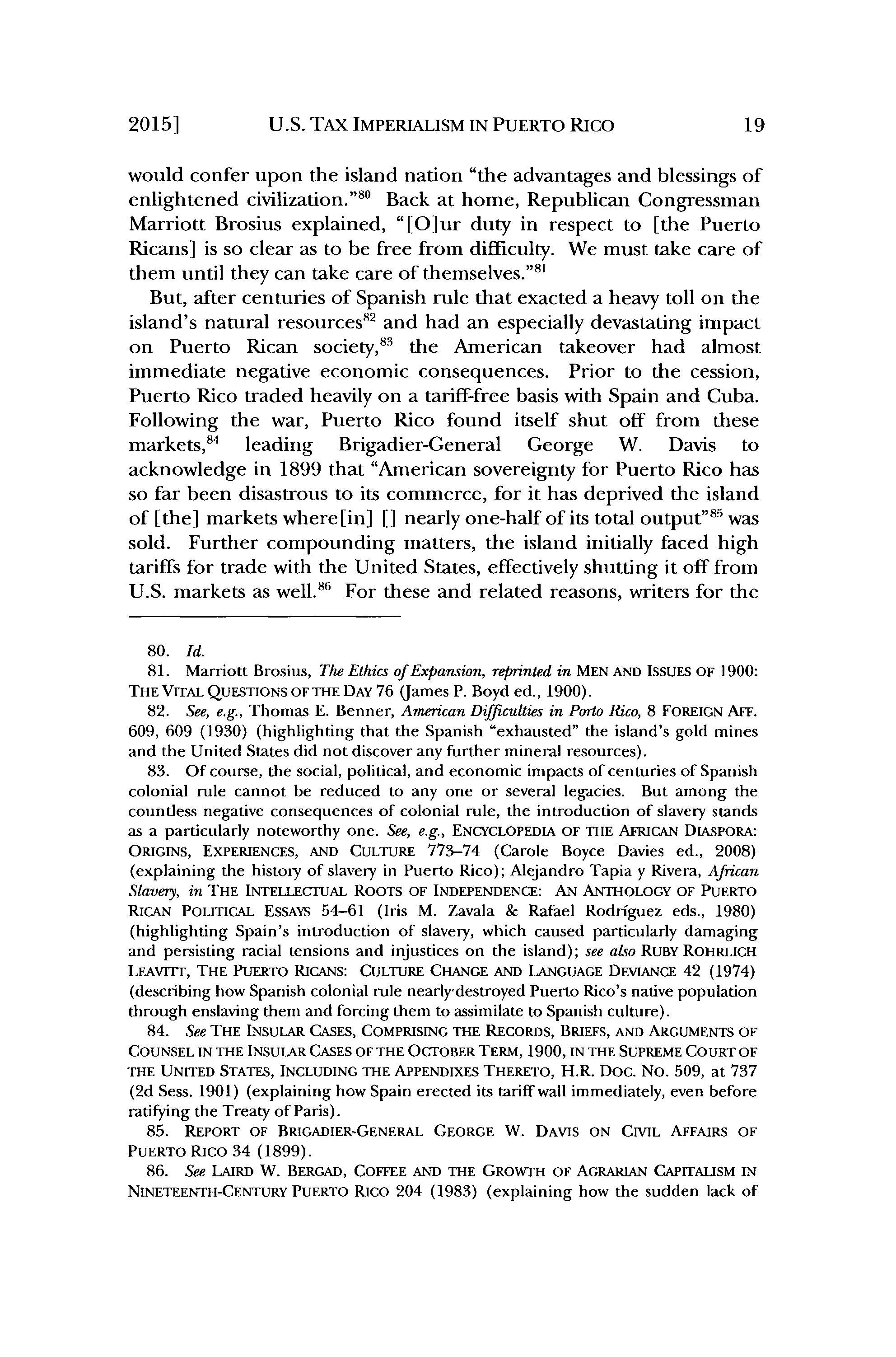
80. Id. 81. Marriott Brosius, The Ethics of Expansion, reprinted in MEN AND ISSUES OF 1900: THE VITAL QUESTIONS OF THE DAY 76 (James P. Boyd ed., 1900). 82. See, e.g., Thomas E. Benner, American Difficulties in Porto Rico, 8 FOREIGN AFF. 609, 609 (1930) (highlighting that the Spanish "exhausted" the island's gold mines and the United States did not discover any further mineral resources). 83. Of course, the social, political, and economic impacts of centuries of Spanish colonial rule cannot be reduced to any one or several legacies. But among the countless negative consequences of colonial rule, the introduction of slavery stands as a particularly noteworthy one. See, e.g., ENCYCLOPEDIA OF THE AFRICAN DIASPORA: ORIGINS, EXPERIENCES, AND CULTURE 773-74 (Carole Boyce Davies ed., 2008) (explaining the history of slavery in Puerto Rico); Alejandro Tapia y Rivera, African Slavery, in THE INTELLECTUAL ROOTS OF INDEPENDENCE: AN ANTHOLOGY OF PUERTO RICAN POLITICAL ESSAYS 54-61 (Iris M. Zavala & Rafael Rodriguez eds., 1980) (highlighting Spain's introduction of slavery, which caused particularly damaging and persisting racial tensions and injustices on the island); see also RUBY ROHRLICH LEAvrrr, THE PUERTO RICANS: CULTURE CHANGE AND LANGUAGE DEVIANCE 42 (1974) (describing how Spanish colonial rule nearly-destroyed Puerto Rico's native population through enslaving them and forcing them to assimilate to Spanish culture). 84. See THE INSULAR CASES, COMPRISING THE RECORDS, BRIEFS, AND ARGUMENTS OF COUNSEL IN THE INSULAR CASES OF THE OCTOBER TERM, 1900, IN THE SUPREME COURT OF THE UNITED STATES, INCLUDING THE APPENDIXES THERETO, H.R. Doc. No. 509, at 737 (2d Sess. 1901) (explaining how Spain erected its tariff wall immediately, even before ratifying the Treaty of Paris). 85. REPORT OF BRIGADIER-GENERAL GEORGE W. DAVIS ON CIVIL AFFAIRS OF PUERTO Rico 34 (1899). 86. See LAIRD W. BERGAD, COFFEE AND THE GROWTH OF AGRARIAN CAPITALISM IN NINETEENTH-CENTURY PUERTO RICO 204 (1983) (explaining how the sudden lack of
20
AMERICAN UNIVERSITY LAW REVIEW [Vol. 65:1
New York Times would remark in 1903 that Puerto Rico "has not prospered under the rule of the United States," and that " [i]t was far better off when Spain governed it."" As the following section reveals, the island's economic struggles were further amplified by a U.S.imposed fiscal reconstruction.
A.
Stage One of U.S. Tax Imperialism in Puerto Rico, 1898-1919
Notwithstanding General Miles' assurance that the United States would not unnecessarily interfere with Puerto Rican laws and customs,' "It]he American commanding general... at once exercised his power of legislation, and statute after statute was abrogated. These were generally tax laws. .. ."" The regime later explained that it "found in force a system of taxes and public duties unlike any that had existed in the United States.""o Although the economic preferences of the previous Spanish colonial regime and the new U.S. imperial power were similar in many respects, the island's extant tax system would require numerous adjustments before it could serve U.S. economic interests. In going about this fiscal reconstruction, American policymakers strived to align Puerto Rico's tax laws with prevailing U.S. theories of taxation" and to provide the ideal economic setting for U.S. corporations doing business in Puerto Rico. Meanwhile, in public debate and promotional materials, policymakers relied upon moral preaching to justify changes, establishing a pattern for public discourse on U.S.Puerto Rican fiscal relations that continues to the present day."
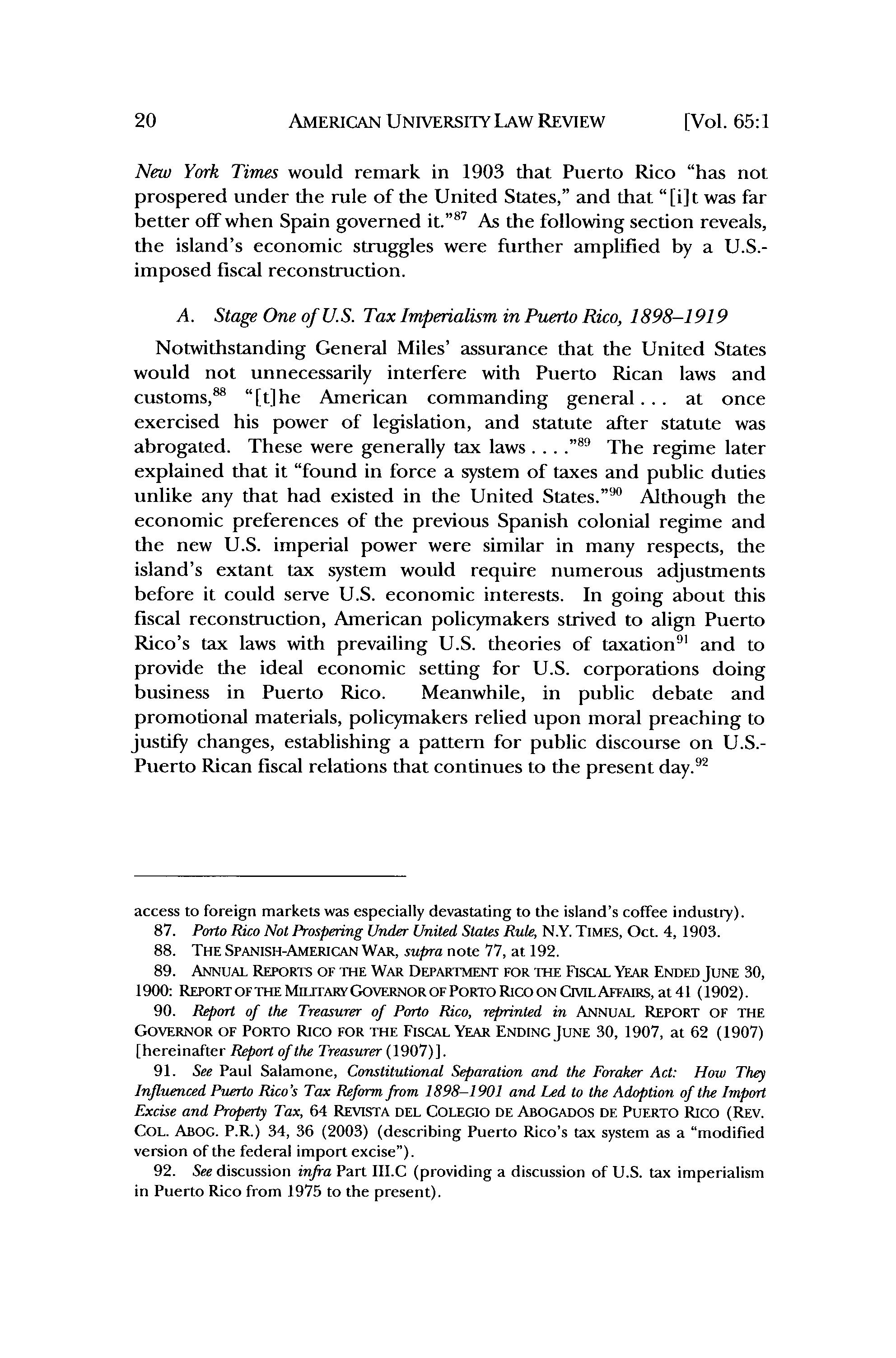
access to foreign markets was especially devastating to the island's coffee industry). 87. Porto Rico Not Prospering Under United States Rule, N.Y. TIMES, Oct. 4, 1903. 88. THE SPANISH-AMERICAN WAR, supra note 77, at 192. 89. ANNUAL REPORTS OF THE WAR DEPARTMENT FOR THE FISCAL YFAR ENDED JUNE 30, 1900: REPORT OF THE MILITARY GOVERNOR OF PORTO Rico ON CIVIL AFFAIRS, at 41 (1902). 90. Report of the Treasurer of Porto Rico, reprinted in ANNUAL REPORT OF THE GOvERNOR OF PORTO RICO FOR THE FISCAL YEAR ENDING JUNE 30, 1907, at 62 (1907) [hereinafter Report of the Treasurer (1907)]. 91. See Paul Salamone, Constitutional Separation and the Foraker Act: How They Influenced Puerto Rico's Tax Reform from 1898-1901 and Led to the Adoption of the Import Excise and Property Tax, 64 REVISTA DEL COLEGIO DE ABOGADOS DE PUERTO RIco (REV. COL. ABOG. P.R.) 34, 36 (2003) (describing Puerto Rico's tax system as a "modified version of the federal import excise"). 92. See discussion infra Part III.C (providing a discussion of U.S. tax imperialism in Puerto Rico from 1975 to the present).
2015)
U.S. TAx IMPERIALISM IN PUERTO RICO 21
1.
U.S. evaluation ofPuerto Rico's extant system of taxation
In 1899, Dr. Henry K. Carroll, a U.S. Special Commissioner to Puerto Rico sent by President William McKinley to examine civil affairs on the island and, in particular, to evaluate the system of taxation," opined that while Puerto Rico had no public debts and had even been in a position to lend money to Spain to support the war in Cuba," its tax laws were quite different from those in place on the mainland." Under Spanish rule, insular revenues were obtained primarily through indirect taxes" in the form of customs duties and stamp taxes. The municipal governments similarly relied upon indirect taxes, largely in the form of excise taxes on food stuffs, fuel, and other articles of consumption,9 8 called consumoP9 taxes. Additionally, the government relied on lotteries and some direct taxes,' 00 including fees for the issuance of personal identification

93. Reforms in Puerto Rico: Commissioner Carroll Returns and Tells of Conditions There, N.Y. TIMES, Mar. 31, 1899. 94. H. K. Carroll, What Has Been Done for Porto Rico Under Military Rule, AM. MONTHLY REv. REvs.,July-Dec. 1899, at 705; see also Report of the Treasurer of Porto Rico, reprinted in WAR DEP'T, ANNUAL REPORTS, 1919, VOL. III, at 360-61 (1919) [hereinafter Report of the Treasurer (1919)] (reporting that although the Spanish Crown extended numerous tax breaks to European settlers in Puerto Rico, the island itself was financially self-sufficient for most of the nineteenth century). 95. Carroll, supra note 94, at 705. 96. In an economic sense, an "indirect tax" is one that is collected indirectlysuch as through a merchant-rather than through a direct assessment upon the person who ultimately bears the economic burden of the tax. Generally speaking, indirect taxes are applied to particular transactions, such as purchases or sales, or imports and exports. Indirect taxes are generally believed to be more regressive, with the burden falling more heavily upon persons with fewer economic resources. See generally BENT HANSEN, THE ECONOMIC THEORY OF FISCAL POLICY 260-78 (P.E. Burke trans., 1958) (explaining direct versus indirect taxation). 97. Excise taxes are taxes "laid upon the manufacture, sale, or consumption of commodities within the country, upon licenses to pursue certain occupations, and upon corporate privileges." Flint v. Stone Tracy Co., 220 U.S. 107, 110 (1911). 98. The system of taxation in place in Puerto Rico at the time of the U.S. takeover is described in J.H. Hollander, Excise Taxation in Porto Rico, 16 Q. J. EcoN. 187 (1902) [hereinafter Hollander, Excise Taxation]. See also J.H. Hollander, The Finances of Porto Rico, 16 POL. SCI. Q. 553 (1901) [hereinafter Hollander, Finances of Porto Rico]; Report of the Treasurer (1907), supra note 90, at 62-63 (describing Puerto Rico's existing system of taxation). 99. See Robert W. Turner, Consumo Taxes in Spain, Sept. 12, 1889, in REPORTS FROM THE CONSULS OF THE UNITED STATES, H.R. Misc. Doc. No. 232, at 338-39 (1st Sess. 1889) (explaining that "consumo" taxes are levied upon articles of consumption). 100. See supra note 96 and accompanying text (explaining that direct taxes are imposed upon each person, who remits the amount owed directly to the government).
22
AMERICAN UNIVERSITY LAW REVIEW [Vol. 65:1
papers and licenses on industrial and professional occupations. 0 Finally, Puerto Ricans were subjected to a percentage tax upon net income derived from agricultural, forest, and pasture land, from the increase of livestock, and from rentals of urban property.1 02 This "territorial" tax was based on the net income of property, in comparison to property taxes on the mainland, which were based on assessed value of the property. In this way, the territorial tax was especially threatening to U.S. sugar corporations: it essentially functioned as an income tax on agricultural operations in Puerto Rico at a time in history when the federal government did not even have a comprehensive individual or corporate income tax.'
In public comments, U.S. policymakers claimed that the Spanish system of taxation fell unfairly on Puerto Rico's lower classes. Carroll critiqued the system as downright oppressive, commenting that "[t]he rule in Porto Rico0o seems to have been to 'pay as you go' and to collect everything collectible. The wonder is that the people had anything left after paying the demands of the government."los Carroll also suggested that the government's policies were designed "to benefit [Spanish] manufacturers and producers" rather than the Puerto Rican people.'o Similarly, Johns Hopkins University economist and Treasurer of Puerto Rico, Jacob Hollander, later noted that the "general policy of the Spanish administration in Porto Rico [was] economic exploitation,"' complaining that the Spanish system imposed a lighter burden upon the "financial, banking,
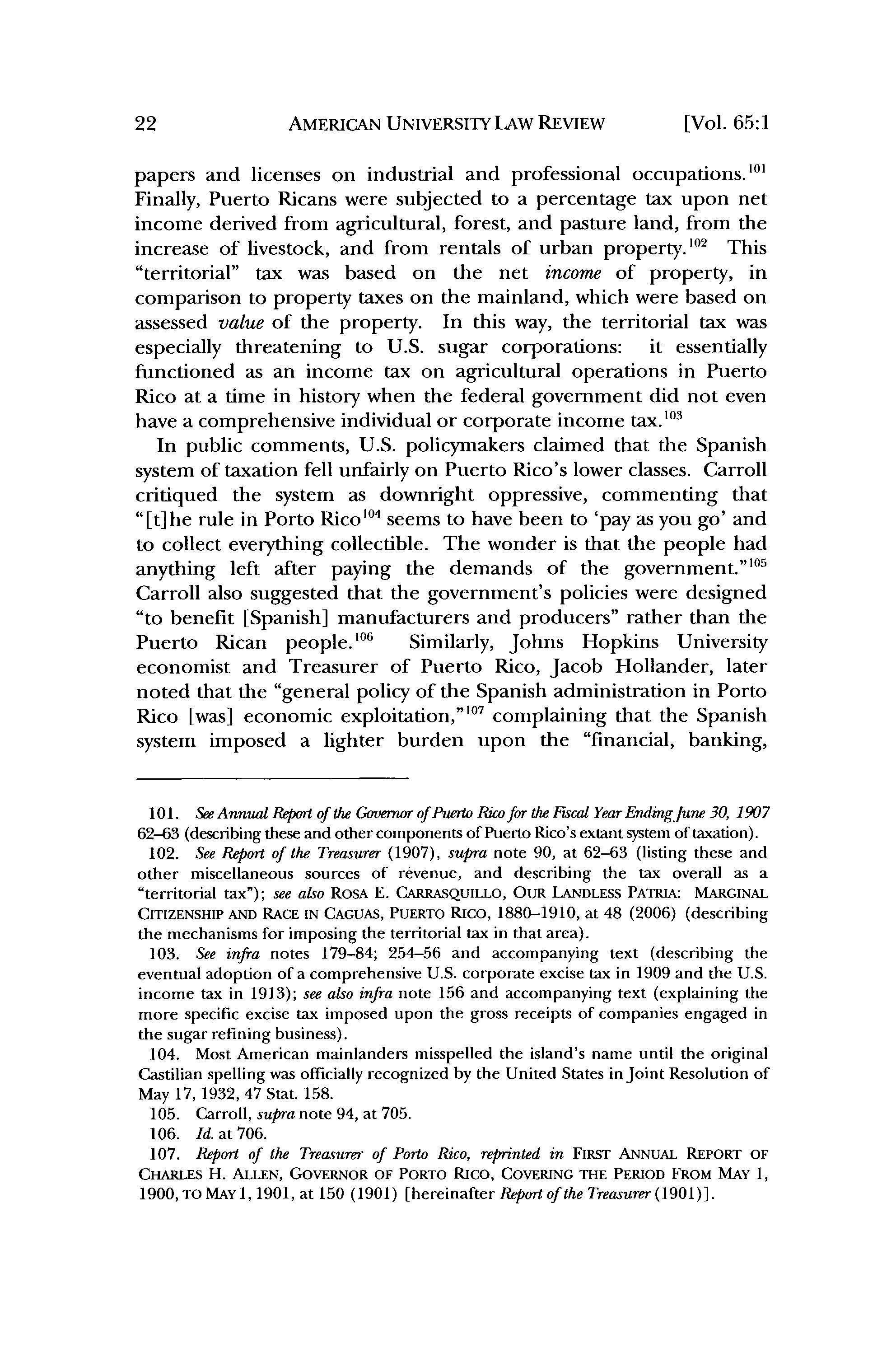
101. See Annual Report of the Governor of Puerto Rico for the Fiscal Year Ending June 30, 1907 62-63 (describing these and other components of Puerto Rico's extant system of taxation). 102. See Report of the Treasurer (1907), supra note 90, at 62-63 (listing these and other miscellaneous sources of revenue, and describing the tax overall as a "territorial tax"); see also ROSA E. CARRASQUILLO, OUR LANDLESS PATRIA: MARGINAL CITIZENSHIP AND RACE IN CAGUAS, PUERTO Rico, 1880-1910, at 48 (2006) (describing the mechanisms for imposing the territorial tax in that area). 103. See infra notes 179-84; 254-56 and accompanying text (describing the eventual adoption of a comprehensive U.S. corporate excise tax in 1909 and the U.S. income tax in 1913); see also infra note 156 and accompanying text (explaining the more specific excise tax imposed upon the gross receipts of companies engaged in the sugar refining business). 104. Most American mainlanders misspelled the island's name until the original Castilian spelling was officially recognized by the United States in Joint Resolution of May 17, 1932, 47 Stat. 158. 105. Carroll, supra note 94, at 705. 106. Id. at 706. 107. Report of the Treasurer of Porto Rico, reprinted in FIRST ANNUAL REPORT OF CHARLES H. ALLEN, GOVERNOR OF PORTO Rico, CovERING THE PERIOD FROM MAY 1, 1900, TO MAY 1, 1901, at 150 (1901) [hereinafter Report of the Treasurer (1901)].
2015]
U.S. TAx IMPERIALISM IN PUERTO RICO
23
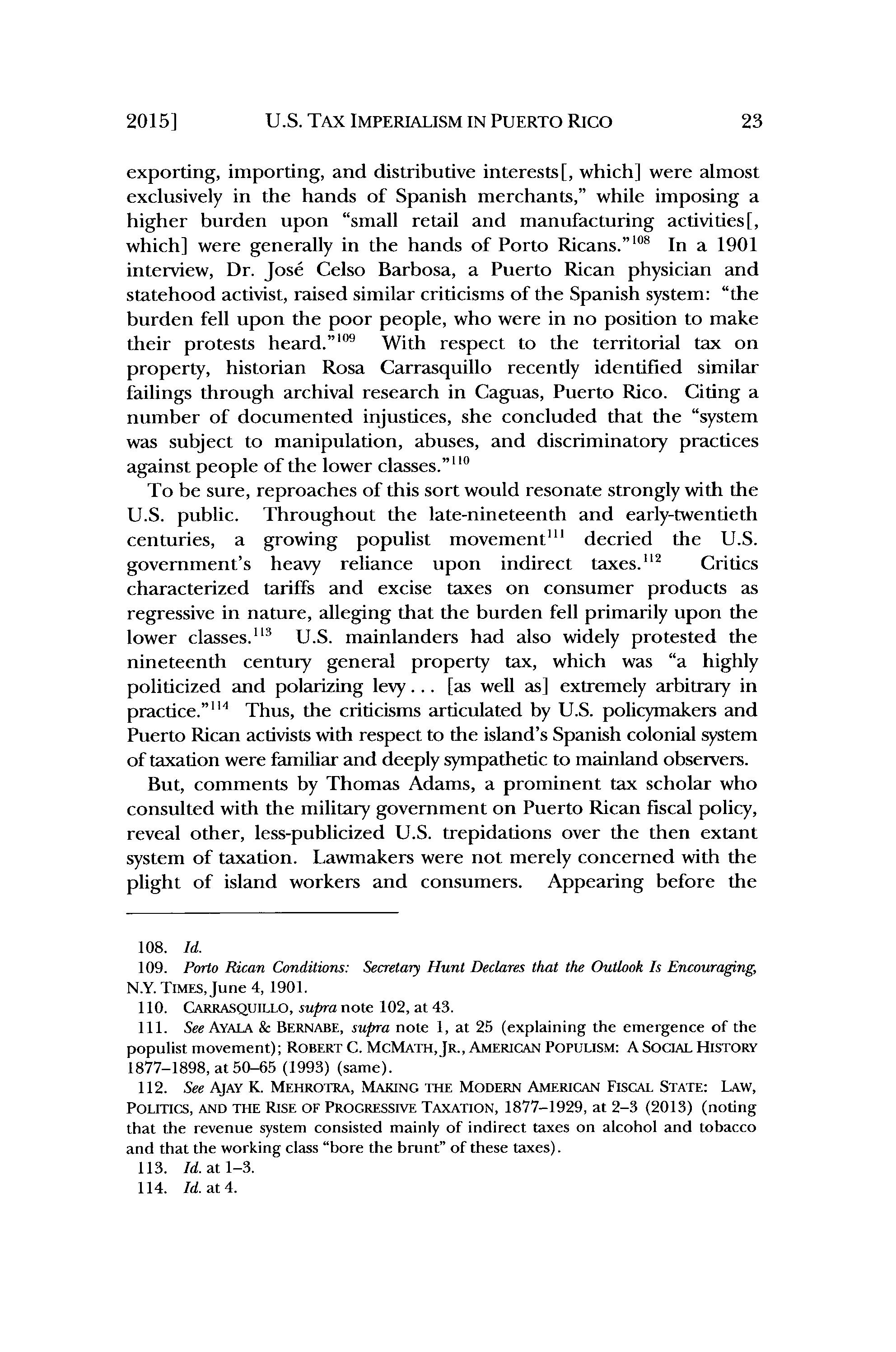
exporting, importing, and distributive interests[, which] were almost exclusively in the hands of Spanish merchants," while imposing a higher burden upon "small retail and manufacturing activities[, which] were generally in the hands of Porto Ricans."'o In a 1901 interview, Dr. Jos6 Celso Barbosa, a Puerto Rican physician and statehood activist, raised similar criticisms of the Spanish system: "the burden fell upon the poor people, who were in no position to make their protests heard."'o With respect to the territorial tax on property, historian Rosa Carrasquillo recently identified similar failings through archival research in Caguas, Puerto Rico. Citing a number of documented injustices, she concluded that the "system was subject to manipulation, abuses, and discriminatory practices against people of the lower classes."'"o
To be sure, reproaches of this sort would resonate strongly with the U.S. public. Throughout the late-nineteenth and early-twentieth centuries, a growing populist movement"' decried the U.S. government's heavy reliance upon indirect taxes." 2 Critics characterized tariffs and excise taxes on consumer products as regressive in nature, alleging that the burden fell primarily upon the lower classes."' U.S. mainlanders had also widely protested the nineteenth century general property tax, which was "a highly politicized and polarizing levy ... [as well as] extremely arbitrary in practice."". Thus, the criticisms articulated by U.S. policymakers and Puerto Rican activists with respect to the island's Spanish colonial system of taxation were familiar and deeply sympathetic to mainland observers.
But, comments by Thomas Adams, a prominent tax scholar who consulted with the military government on Puerto Rican fiscal policy, reveal other, less-publicized U.S. trepidations over the then extant system of taxation. Lawmakers were not merely concerned with the plight of island workers and consumers. Appearing before the
108. Id. 109. Porto Rican Conditions: Secretary Hunt Declares that the Outlook Is Encouraging, N.Y. TIMES, June 4,1901. 110. CARRASQUILLO, supra note 102, at 43. 111. See AYALA & BERNABE, supra note 1, at 25 (explaining the emergence of the populist movement); ROBERT C. MCMATHJR., AMERICAN POPULISM: A SOCIAL HISTORY 1877-1898, at 50-65 (1993) (same). 112. See AJAY K. MEHROTRA, MAKING THE MODERN AMERICAN FISCAL STATE: LAw, POLITICS, AND THE RISE OF PROGRESSIVE TAXATION, 1877-1929, at 2-3 (2013) (noting that the revenue system consisted mainly of indirect taxes on alcohol and tobacco and that the working class "bore the brunt" of these taxes). 113. Id. at 1-3. 114. Id. at 4.
24
AMERICAN UNIVERSITY LAW REVIEW [Vol. 65:1
American Economic Association in 1901, Adams discussed consumo taxes on sugar and other agricultural products shipped out of Puerto Rico and on coal brought into the island, which, he argued, using anecdotal evidence, were too high."' He also suggested that Puerto Rico imposed higher licensing taxes on foreign importers than on Puerto Rican entrepreneurs.1 1 6 Finally, he criticized Puerto Rico's failure to levy excises on goods that were considered socially undesirable by U.S. standards, such as alcohol and tobacco."' He expressed hope that under a U.S. system of taxation "the peon will get a little more codfish and a little less rum.""8
Thus, the military government acted quickly to reconfigure Puerto Rico's system of taxation. It dismantled the previous bureaucratic structure and designated an office within the civil secretary's office to administer and collect taxes, which would be directed by Puerto Rican writer and historian, Dr. Cayetano Coll y Toste."s American officials discontinued the government lottery, the consumo taxes, the stamp taxes, and many of the customs duties.120
In 1907, Professor Hollander questioned the military government's sweeping changes, particularly its abolishment of successful Puerto Rican stamp taxes that had "yield [ed] considerable revenues without imposing an onerous burden on any particular class, and were actually less extensive than existent internal revenue taxes on similar transactions in the United States."' 2 ' He remarked that the government's eradication of the consumo taxes, in particular, was far from "the benevolent end contemplated.""' He explained,
In Porto Rico the economic relations of retail trade are determined by custom rather than by competition; and the sudden removal of octrois simply resulted in increased profit to the retailer rather than
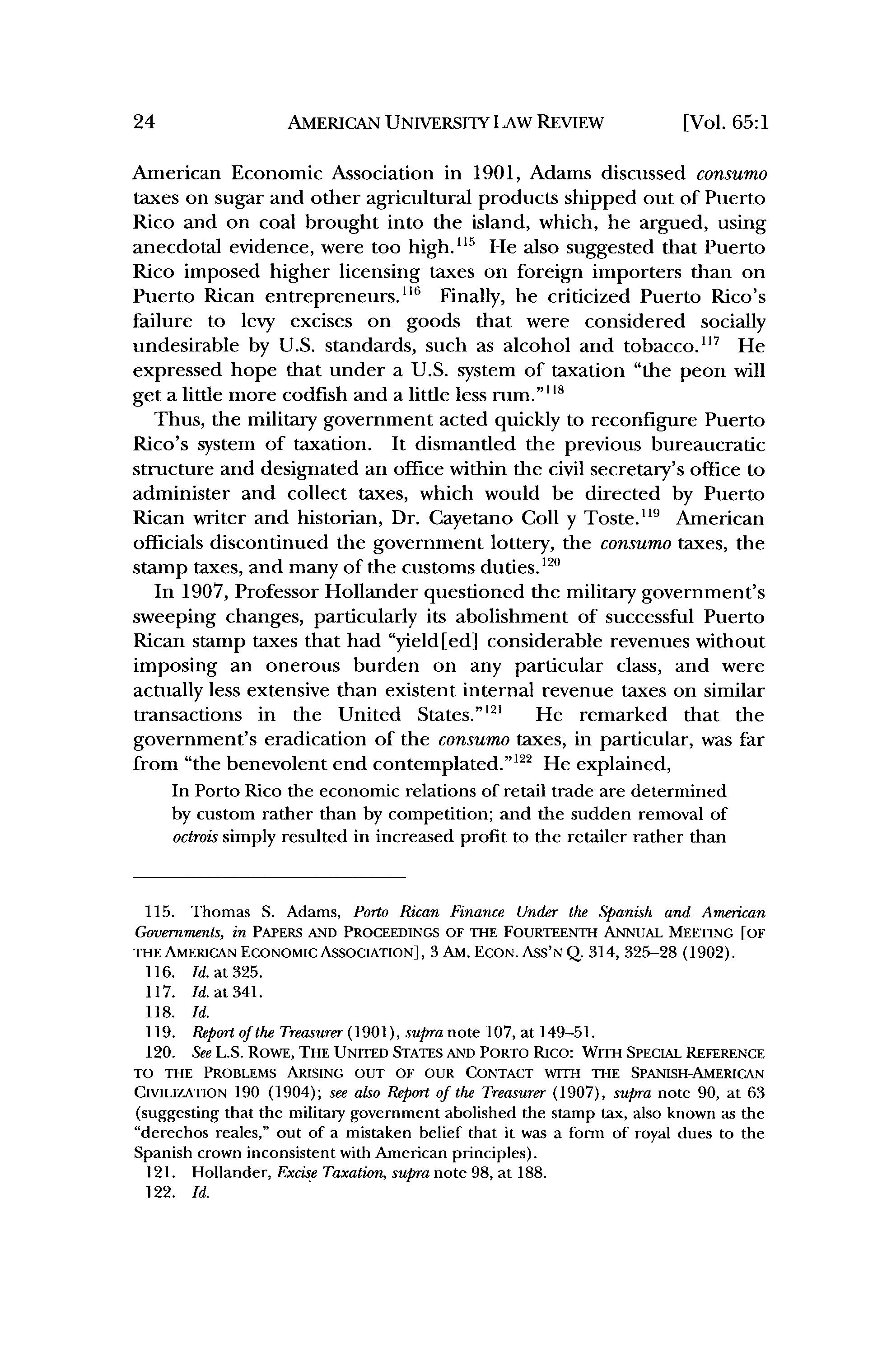
115. Thomas S. Adams, Porto Rican Finance Under the Spanish and American Governments, in PAPERS AND PROCEEDINGS OF THE FOURTEENTH ANNUAL MEETING [OF THE AMERICAN ECONOMIC ASSOCIATION], 3 AM. EcoN. Ass'N Q. 314, 325-28 (1902). 116. Id. at 325. 117. Id. at 341. 118. Id. 119. Report of the Treasurer (1901), supra note 107, at 149-51. 120. See L.S. ROwE, THE UNITED STATES AND PORTO Rico: WITH SPECIAL REFERENCE TO THE PROBLEMS ARISING OUT OF OUR CONTACT WITH THE SPANISH-AMERICAN CIVILIZATION 190 (1904); see also Report of the Treasurer (1907), supra note 90, at 63 (suggesting that the military government abolished the stamp tax, also known as the "derechos reales," out of a mistaken belief that it was a form of royal dues to the Spanish crown inconsistent with American principles). 121. Hollander, Excise Taxation, supra note 98, at 188. 122. Id.
2015]
U.S. TAx IMPERIALISM IN PUERTO RICO
25
in reduced cost to the purchaser. The municipal treasuries were depleted, and a minimum benefit was derived by the consumer. 1 2 1
He remained highly critical of the license taxes that were retained, as they seemed to favor Spanish entrepreneurs while disproportionately burdening others:
The financial and commercial interests were almost exclusively in the hands of Spanish merchants, and upon these classes the rates of taxation were relatively low. The small retail and manufacturing activities were generally in the hands of Porto Ricans, and upon these the taxes were comparatively high.1 24 Notwithstanding these reflective criticisms, the U.S.-led fiscal restructuring of Puerto Rico would continue unabated.
2. U.S. adjustments to Puerto Rico's extant system of taxation
In search of new revenue sources and eager to abolish the Spanish territorial tax, the military government in 1899 directed Dr. Cayetano Coll y Toste to develop a new system of property taxation. In response, Coll y Toste proposed a law that would no longer assess the tax based upon income derived from agricultural property. Instead, assessments would be based on the use and quality of the land, as determined by a classification scheme.' 5 In this way, Coll y Toste's new tax was responsive to the needs of U.S. sugar corporations. But, while the proposal reflected some aspects of U.S. mainland property taxation, it continued to imitate Spanish modes of property taxation. For instance, with respect to urban property, assessments would still be based upon net rental value.12" The tax also imposed a higher burden on nonresident owners of both urban and agricultural land, subjecting them to an additional surcharge equal to fifty percent of the usual rate.1 2 1
The military government made Coll y Toste's property tax effective July 1, 1899." The new law "was debated among Puerto Ricans who favored and condemned it,"' with at least one Puerto Rican
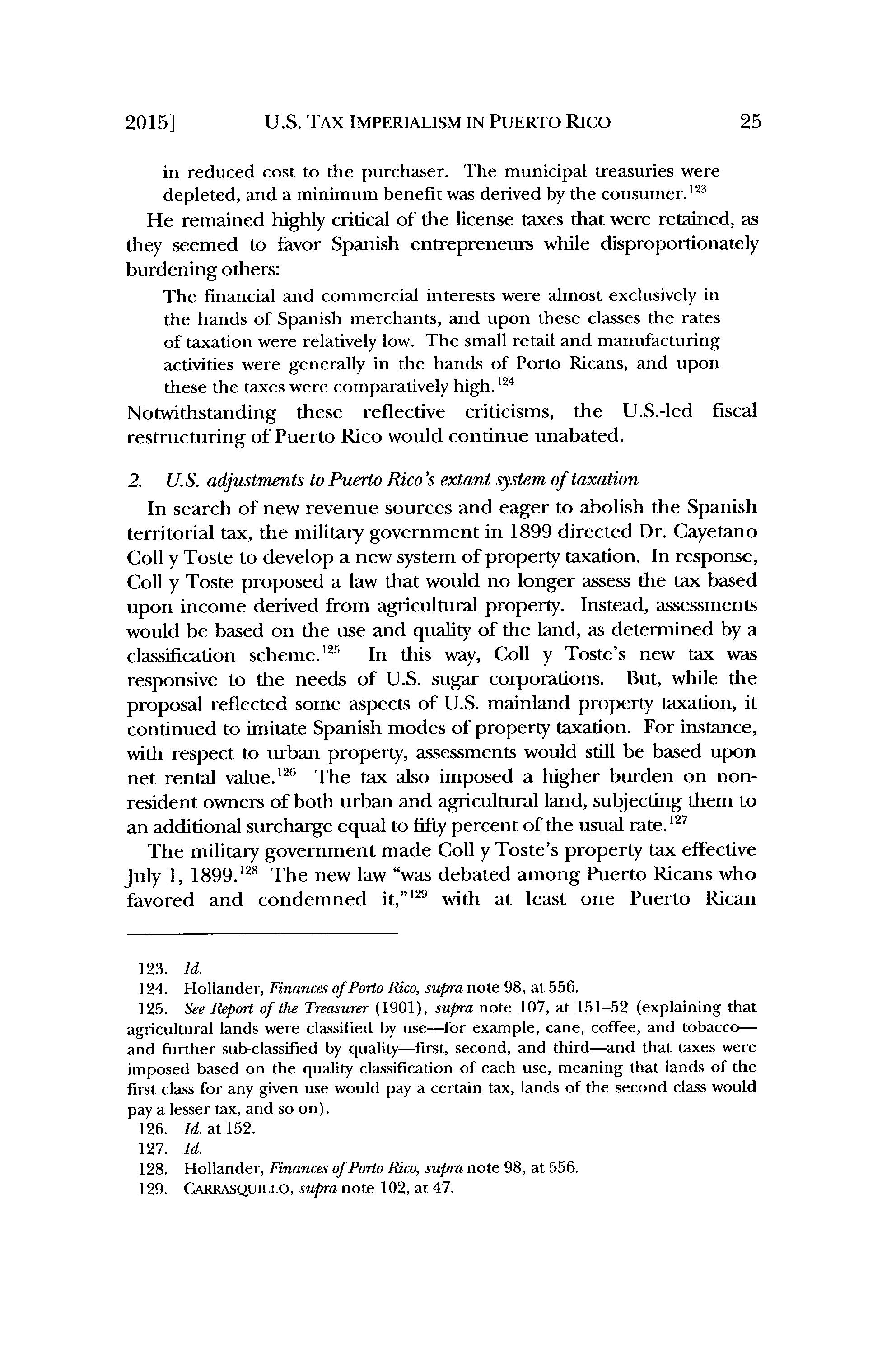
123. Id.
124. Hollander, Finances ofPorto Rico, supra note 98, at 556. 125. See Report of the Treasurer (1901), supra note 107, at 151-52 (explaining that agricultural lands were classified by use-for example, cane, coffee, and tobaccoand further sub-classified by quality-first, second, and third-and that taxes were imposed based on the quality classification of each use, meaning that lands of the first class for any given use would pay a certain tax, lands of the second class would pay a lesser tax, and so on). 126. Id. at 152. 127. Id. 128. Hollander, Finances ofPorto Rico, supra note 98, at 556. 129. CARRASQUILLO, supra note 102, at 47.
26
AMERICAN UNiVERSITY LAW REVIEW [Vol. 65:1

newspaper declaring it to be "patriotic" and "fair," despite its inherent flaws.3 o For his part, Professor Hollander, appointed in February 1900 to conduct another evaluation of Puerto Rican tax laws,' 3 1 severely criticized the new law.'3 2 At the time, property taxes were a primary source of public financing on the U.S. mainland,1 33 and policymakers naturally had strong views regarding the proper structure of such a tax.
Hollander did not censor his condemnations, even declaring that Coll y Toste's new land classification scheme was "crude" and "primitive," stating that the scheme was based upon theories of taxation that had been "discarded by every civilized country on its emergence from financial infancy."3 ' He primarily argued that the new property tax failed to properly incentivize more productive uses of land, a flaw apparent in the tax exemptions given to "uncultivated agricultural and unimproved city property.""' He further referred to the law's two-year exemption for new houses and nonresident surcharge on agricultural lands as "unfortunate innovations." 3 Hollander's distaste for the nonresident surcharge may have stemmed from the fact that it ran afoul of tax provisions in the Northwest Ordinance, which many viewed as a highly persuasive precedent for new U.S. territories.
130. See id. (explaining that the new tax would force small producers and owners of large farms to pay the same tax percentage). 131. Puerto Rican Taxation Laws: Prof Hollander Appointed Special Commissioner to Revise Them, N.Y. TIMES, Feb. 23, 1900. 132. See infra notes 134-37. 133. See generally John Joseph Wallis, A History of the Property Tax in America, in
PROPERTY TAXATION AND LOCAL GOVERNMENT FINANCE 131-39 (Wallace E. Oates ed., 2001) (explaining the role of property taxes in funding the U.S. government). 134. Hollander, Finances ofPorto Rico, supra note 98, at 557. 135. Report of the Treasurer (1901), supra note 107, at 152. 136. Id. 137. See BARTHOLOMEW H. SPARROW, THE INSULAR CASES AND THE EMERGENCE OF AMERICAN EMPIRE 27 (2006) (stating that the Northwest Ordinance and all subsequent similar legislation prevented territorial and state legislatures from taxing nonresidents' land higher than residents' land). The Northwest Ordinance was enacted in 1787 and served as the fundamental governing instrument for the Northwest Territory. 16 AM. JUR. 2d Constitutional Law § 7 Westlaw (database updated Aug. 2015). Among its provisions, the Northwest Ordinance provided that nonresident proprietors may not be taxed higher than residents. An Ordinance for the Government of the Territory of the United States north-west of the river Ohio, art. IV, 1 Stat. 50, 52 n.(a) (1789).
2015]
U.S. TAx IMPERIALISM IN PUERTO RICO
27
Following a devastating hurricane in August 1899,'" the military government found itself in severe financial distress. In response to pressure from large landowners-particularly corporate agricultural interests' 3 9-the government halted the collection of most taxes, as well as all enforcement activities, even allowing for remittance of some taxes already paid.' The insular government attempted to raise revenue by establishing, via military orders, new consumer excise taxes on liquor, matches, oleomargarine, and playing cards."' The new taxes, which essentially copied the so-called "sin taxes" that were becoming increasingly common on the U.S. mainland,"' were extremely unpopular among islanders. Residents expressed their disapproval through a variety of evasion techniques, including outright fraud and illicit trade."' Dealers and merchants-who were generally native Puerto Ricans-also protested the new laws, complaining of a lack of clarity as to which articles were covered and whether the taxes applied to existing inventories imported under much higher tariff regimes.' 4

138. See generally Stuart B. Schwartz, The Hurricane of San Ciriaco: Disaster, Politics, and Society in Puerto Rico, 1899-1901, 72 HISP. Am. HIST. REv. 303, 304 (1992) (detailing the hurricane's social implications and "horrendous" devastation to Puerto Rico). 139. Id. at 310-12 (explaining how landowners' petitions for tax relief for everyone-not just people who could document a loss after the hurricane-spurred the grant of the tax holiday). 140. General Orders, No. 125, Aug. 22, 1899, in REPORT OF BRIG. GEN. GEO. W. DAVIS ON CIVIL AFFAIRS IN PUERTO Rico, at 144 (1899). 141. See LAws, ORnINANcEs, DECREES, AND MILITARY ORDERS HAVING THE FORCE OF LAw, EFFECTIVE IN PORTO Rico, MAY 1, 1900, H.R. Doc. No. 1484, at 1977-78 (2d Sess. 1909) (summarizing the excises and other miscellaneous taxes established by general orders of the U.S. military); see also Report of the Treasurer (1901), supra note 107, at 154 (explaining that the military government also established a poll tax in 1899 to support schools, although this tax was largely uncollected and essentially discontinued in 1900). 142. See generally Rachelle Holmes Perkins, Salience and Sin: Designing Taxes in the New Sin Era, 2014 BYU L. REv. 143, 150-52 (explaining that before the U.S. government reinstated the income tax on the mainland in 1913, it raised the majority of its revenue through tobacco and alcohol taxes, also referred to as "sin taxes"). For example, with respect to Puerto Rico's tax on oleomargarine, a similar tax was initially imposed upon the food product on the U.S. mainland in 1886. Act of Aug. 2, 1886, ch. 840, 24 Stat. 209, 209-13; see McCray v. United States, 195 U.S. 27, 27 (1904) (upholding the federal tax on oleomargarine). 143. Hollander, Excise Taxation, supra note 98, at 189-90. 144. See Porto Rican Tax Troubles: Protest Against Impost on German Beer and Other Articles, N.Y. TIMES, June 16, 1900 (discussing the discrepancies and confusion regarding the Foraker Act's taxation of alcoholic beverages).
28
AMERICAN UNIVERSITY LAW REVIEW [Vol. 65:1
But the most sweeping changes came in Congress's first major legislative act with respect to Puerto Rico, the Foraker Act of 1900.115 The Foraker Act, which went into effect in the spring of that same year, ended military rule and installed a civilian colonial government. The Act placed the island within the U.S. common market'1 but also established a peculiar brand of "Puerto Rican citizenship," which would be recognized only by the United States. 4 7
The Foraker Act did not, however, establish a fully democratic government. The U.S. President retained the right to appoint the Governor, all heads of administrative departments, and all members of the highest branch of the legislature-the majority of which would be U.S. citizens rather than native Puerto Ricans.1 4 8 Moreover, any acts by the lower branch of the legislature were subject to veto by the upper branch, the Governor, or the U.S. Congress.14 Puerto Rican journalist and politician Vincente Balbdis Cap6 complained that, under this system, Puerto Rican political parties were meaningless: they had "no power to act. They do what the governing power and [U.S.-controlled upper branch of the legislature] want them to do . . . ."o In his view, the notion of a republican form of government in Puerto Rico was a sham, pursuant to which "the president's representative use [d] the parties as instruments, to pretend that he [was] vesting in the country faculties [that] the governing power and the [upper branch of the legislature] reserve

145. Organic Act of 1900, ch. 191, § 17, 31 Stat. 77, 81 (codified as amended at 48 U.S.C. §§ 733, 736, 738-40, 744, 866). 146. See infra notes 174, 176 and accompanying text (explaining that the Foraker Act provided for a maximum of two years of reduced tariffs on certain goods, then fully free trade, between the United States and Puerto Rico). 147. See Juan Manuel Carri6n, Puerto Rican Nationalism and the Struggle for Independence, in BERCH BERBEROGLU, THE NATIONAL QUESTION: NATIONALISM, ETHNIC CONFLICr & SELF-DETERMINATION IN THE 20TH CENTURY 138 (1995) (exploring the oddities of "Puerto Rican citizenship" extended under the Foraker Act); see also No Citizenship for Porto Rico, CHI. TRIB., Dec. 21, 1906, at I ("The condition of the people of Porto Rico is anomalous. They have no real citizenship anywhere."). 148. § 17, 31 Stat. at 81 (addressing the appointment of the Governor); § 18, 31 Stat. at 81 (addressing the appointment of members of the highest branch of the legislature, known as the Executive Council); §§ 29, 35, 31 Stat at 83-84 (addressing the election of delegates to the lower branch of the legislature, known as the House of Delegates). See generally William Franklin Willoughby, The Executive Council of Porto Rico, I AM. POL. Sc. REv. 561, 561-62 (1906) (describing the inner workings of the Executive Council). 149. Willoughby, supra note 148, at 568. 150. Vincente Balbis Cap6, The Emigrants, in THE INTELLECTUAL ROOTS OF INDEPENDENCE, supra note 83, at 127.
20151
U.S. TAx IMPERIALISM IN PUERTO RICO
29
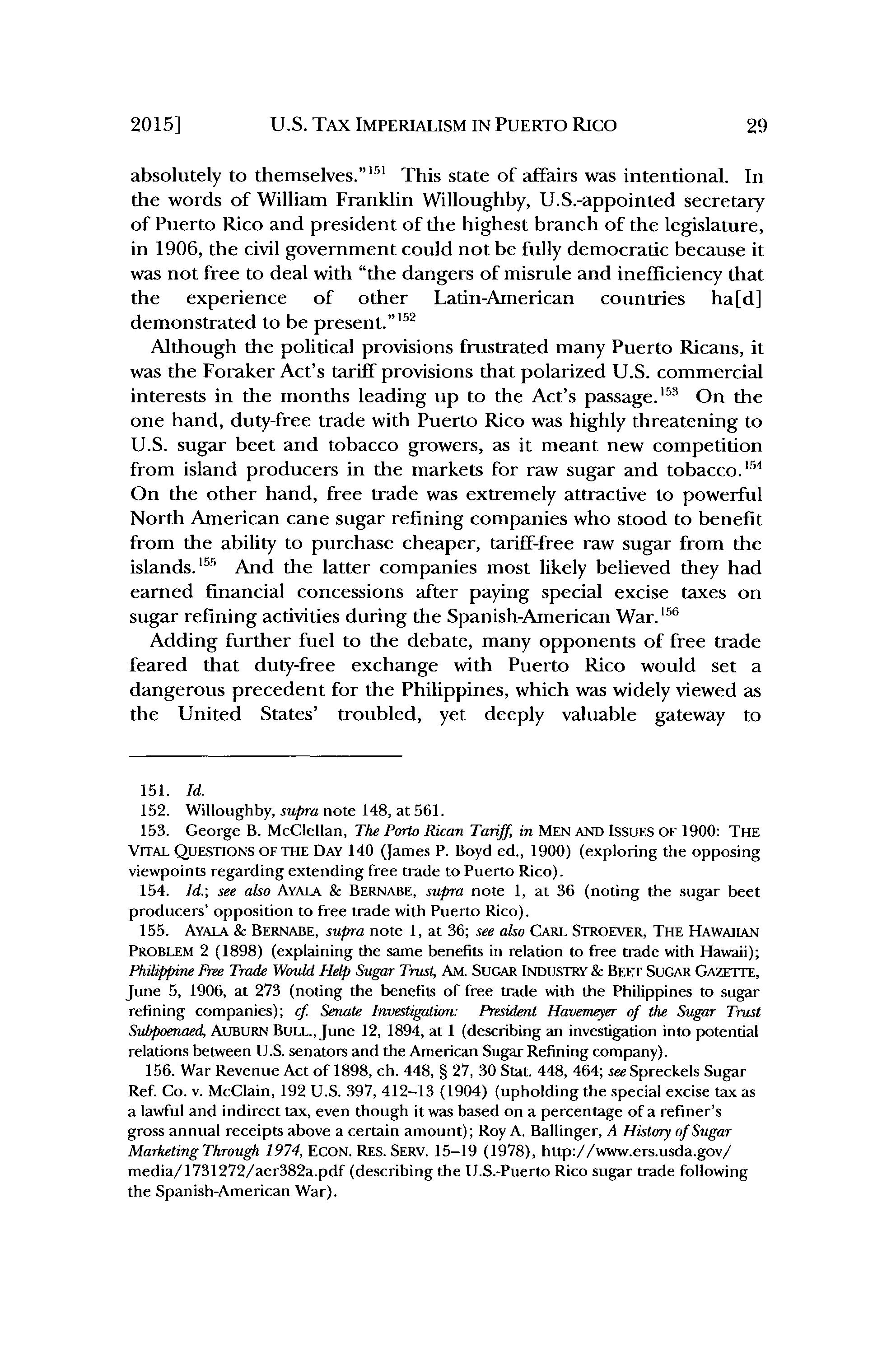
absolutely to themselves."' This state of affairs was intentional. In the words of William Franklin Willoughby, U.S.-appointed secretary of Puerto Rico and president of the highest branch of the legislature, in 1906, the civil government could not be fully democratic because it was not free to deal with "the dangers of misrule and inefficiency that the experience of other Latin-American countries ha[d] demonstrated to be present."'5 2
Although the political provisions frustrated many Puerto Ricans, it was the Foraker Act's tariff provisions that polarized U.S. commercial interests in the months leading up to the Act's passage.'" On the one hand, duty-free trade with Puerto Rico was highly threatening to U.S. sugar beet and tobacco growers, as it meant new competition from island producers in the markets for raw sugar and tobacco.' On the other hand, free trade was extremely attractive to powerful North American cane sugar refining companies who stood to benefit from the ability to purchase cheaper, tariff-free raw sugar from the islands.' And the latter companies most likely believed they had earned financial concessions after paying special excise taxes on sugar refining activities during the Spanish-American War.'
Adding further fuel to the debate, many opponents of free trade feared that duty-free exchange with Puerto Rico would set a dangerous precedent for the Philippines, which was widely viewed as the United States' troubled, yet deeply valuable gateway to
151. Id. 152. Willoughby, supra note 148, at 561. 153. George B. McClellan, The Porto Rican Taniff in MEN AND ISSUES OF 1900: THE VrrAL QUESTIONS OF THE DAY 140 (James P. Boyd ed., 1900) (exploring the opposing viewpoints regarding extending free trade to Puerto Rico). 154. Id.; see also AYALA & BERNABE, supra note 1, at 36 (noting the sugar beet producers' opposition to free trade with Puerto Rico). 155. AYALA & BERNABE, supra note 1, at 36; see also CARL STROEVER, THE HAWAIAN PROBLEM 2 (1898) (explaining the same benefits in relation to free trade with Hawaii); Philippine Free Trade Would Help Sugar Trust, AM. SUGAR INDUSTRY & BEET SUGAR GAZETFE, June 5, 1906, at 273 (noting the benefits of free trade with the Philippines to sugar refining companies); cf Senate Investigation: President Havemeyer of the Sugar Trust Subpoenaed, AUBURN BULL., June 12, 1894, at I (describing an investigation into potential relations between U.S. senators and the American Sugar Refining company). 156. War Revenue Act of 1898, ch. 448, § 27, 30 Stat. 448, 464; see Spreckels Sugar Ref. Co. v. McClain, 192 U.S. 397, 412-13 (1904) (upholding the special excise tax as a lawful and indirect tax, even though it was based on a percentage of a refiner's gross annual receipts above a certain amount); Roy A. Ballinger, A History of Sugar Marketing Through 1974, EcON. RES. SERV. 15-19 (1978), http://www.ers.usda.gov/ media/1731272/aer382a.pdf (describing the U.S.-Puerto Rico sugar trade following the Spanish-American War).
30
AMERICAN UNIVERSITY LAW REVIEW [Vol. 65:1

burgeoning Asian markets."' Acknowledging the prospect of ripple effects beyond Puerto Rico, the named sponsor of the Foraker Act focused his attention on the potential costs and benefits of the proposed legislation to U.S. corporate interests. Citing the necessity of new markets for American products-and the concomitant need to carefully manage any potential spillover effects in the PhilippinesSenator Foraker explained, "[w]e have reached the point in the development of our resources and the multiplication of our industries where we are not only supplying our home demands, but are producing a large surplus, constantly growing larger. Our greatest present and prospective commercial need is for markets abroad."' 8
President McKinley, already well-known for supporting protective tariffs that benefited U.S. commercial interests, advocated in favor of free trade between the United States and Puerto Rico.'"5 The President publicly claimed that free access to U.S. markets would help the Puerto Rican economy, which was in dire need of assistance following the 1899 hurricane.6 o At least on the surface, his views seemed to reinforce those of prominent Puerto Ricans.' 6 ' But, just a decade earlier, as chairman of the House Ways and Means Committee, McKinley had exposed his alliance with large U.S. sugar refineries. For instance, in 1890, long before the United States acquired Puerto Rico, McKinley sponsored legislation allowing for duty-free imports of all island sugars into the United States. Many scholars believe the move was intended to benefit leading east-coast sugar refineries who were struggling to compete with western refineries that acquired duty-free raw sugar from Hawaii.'" McKinley revealed his preferences when he testified in Congress that, although he supported free trade in raw sugar, "[t]he refiners should have
157. AYALA & BERNABE, suptra note 1, at 36. 158. JOSEPH BENSON FORAKER, SPEECHES OFJ.B. FORAKER, 1869-1917, VOLUME 3, 64 (1917) (noting that U.S. commercial interests needed to sell surplus goods abroad after fulfilling domestic demands). 159. See generally QUENTIN R. SKRABEC, JR., WILLIAM McKINLEY: APOSTLE OF PROTECTIONISM (2008) (exploring President McKinley's reputation for protectionism). 160. See, e.g., President William McKinley, Third Annual Message to Congress (Dec. 5, 1899), www.presidency.ucsb.edu/ws/?pid=29540. 161. See J.J. HENNA & M. ZENO GANDiA, THE CASE OF PUERTO Rico 14-18 (1899) (making an impassioned plea for free trade). 162. CtSARJ. AYALA, AMERICAN SUGAR KINGDOM: THE PLANTATION ECONOMY OF THE SPANISH CARIBBEAN, 1898-1934, at 56 (1999); see also KEVIN PHILLIPS, WEALTH AND DEMOCRACY: A POLITICAL HISTORY OF THE AMERICAN RICH 242 (2002) (intimating McKinley's tendency to align with trusts).
2015]
U.S. TAX IMPERIALISM IN PUERTO RICO
31
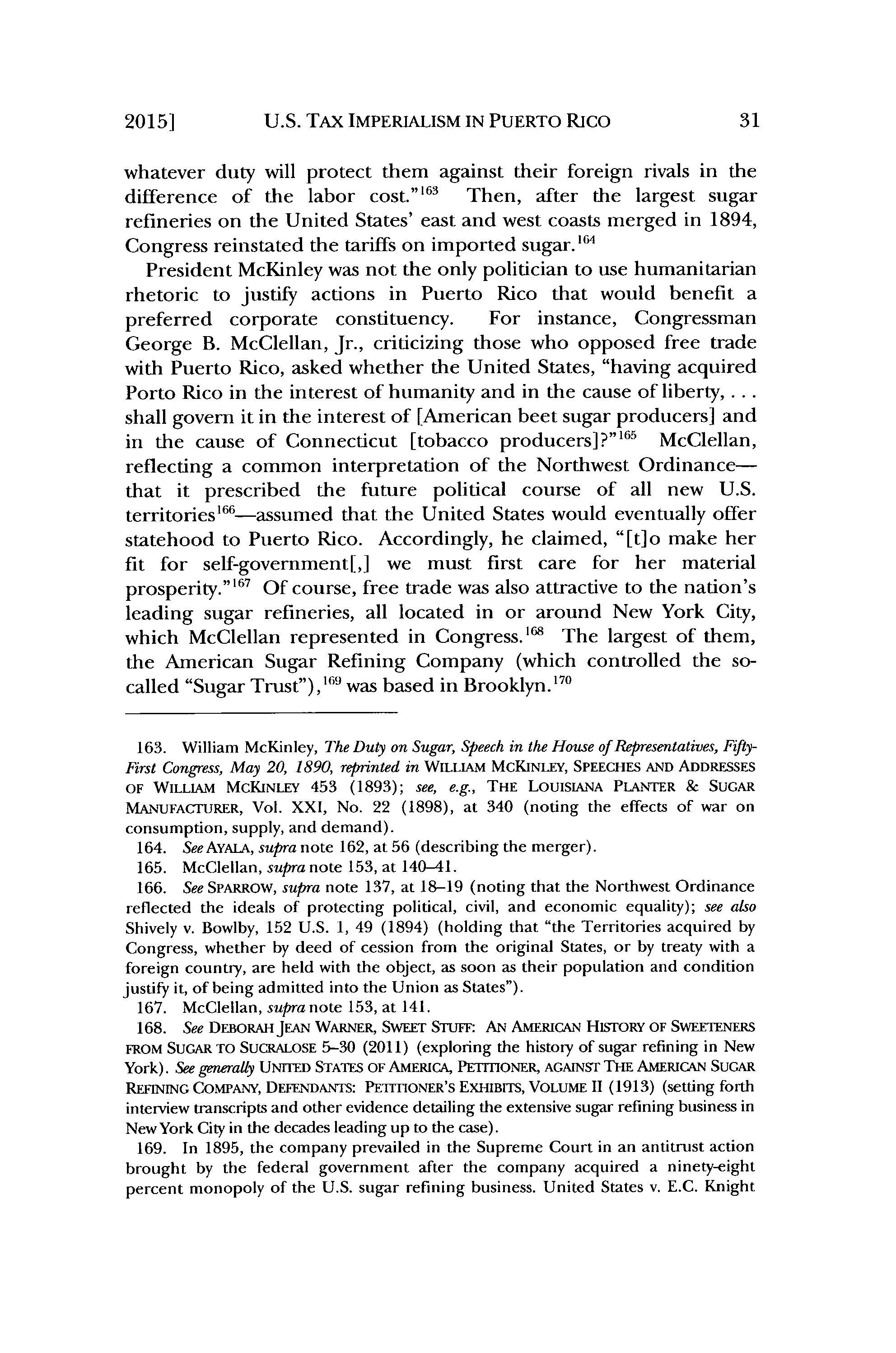
whatever duty will protect them against their foreign rivals in the difference of the labor cost."'6 3 Then, after the largest sugar refineries on the United States' east and west coasts merged in 1894, Congress reinstated the tariffs on imported sugar.'6
President McKinley was not the only politician to use humanitarian rhetoric to justify actions in Puerto Rico that would benefit a preferred corporate constituency. For instance, Congressman George B. McClellan, Jr., criticizing those who opposed free trade with Puerto Rico, asked whether the United States, "having acquired Porto Rico in the interest of humanity and in the cause of liberty,.... shall govern it in the interest of [American beet sugar producers] and in the cause of Connecticut [tobacco producers]?""' McClellan, reflecting a common interpretation of the Northwest Ordinancethat it prescribed the future political course of all new U.S. territories `-assumed that the United States would eventually offer statehood to Puerto Rico. Accordingly, he claimed, "[t]o make her fit for self-government[,] we must first care for her material prosperity."' Of course, free trade was also attractive to the nation's leading sugar refineries, all located in or around New York City, which McClellan represented in Congress.' The largest of them, the American Sugar Refining Company (which controlled the socalled "Sugar Trust"),'" was based in Brooklyn.'70
163. William McKinley, The Duty on Sugar, Speech in the House of Representatives, FiftyFirst Congress, May 20, 1890, reprinted in WILLIAM McKINLEY, SPEECHES AND ADDRESSES OF WILLIAM McKINLEY 453 (1893); see, e.g., THE LOUISIANA PLANTER & SUGAR MANUFACTURER, Vol. XXI, No. 22 (1898), at 340 (noting the effects of war on consumption, supply, and demand). 164. See AYALA, supra note 162, at 56 (describing the merger). 165. McClellan, supra note 153, at 140-41. 166. See SPARROw, supra note 137, at 18-19 (noting that the Northwest Ordinance reflected the ideals of protecting political, civil, and economic equality); see also Shively v. Bowlby, 152 U.S. 1, 49 (1894) (holding that "the Territories acquired by Congress, whether by deed of cession from the original States, or by treaty with a foreign country, are held with the object, as soon as their population and condition justify it, of being admitted into the Union as States"). 167. McClellan, supra note 153, at 141. 168. See DEBORAH JEAN WARNER, SWEET STUFF: AN AMERIcAN HISTORY OF SWEETENERS FROM SUGAR TO SUCRALOSE 5-30 (2011) (exploring the history of sugar refining in New York). See generally UNrrED STATES OF AMERICA, PETITIONER, AGAINST THE AMERICAN SUGAR REFINING COMPANY, DEFENDANTS: PETITONER'S EXHIBITS, VOLUME 11 (1913) (setting forth interview transcripts and other evidence detailing the extensive sugar refining business in New York City in the decades leading up to the case). 169. In 1895, the company prevailed in the Supreme Court in an antitrust action brought by the federal government after the company acquired a ninety-eight percent monopoly of the U.S. sugar refining business. United States v. E.C. Knight
32
AMERICAN UNIVERSITY LAW REVIEW [Vol. 65:1

Large American and European corporations doing business in Puerto Rico also called for free trade, even advocating against all forms of federal taxation on the island. For instance, a representative for the Fritze-Lundt Company, a German-owned enterprise that was then the largest shipper of sugar in Puerto Rico, stated, "[i] f the tariff had been removed at first, Porto Rico would now have double [the] crops.""' Mullenhoff & Korber, a prominent German financial institution in Puerto Rico, declared that it would "be a hard blow if the internal revenues of the United States were applied here.""' Indeed, a prominent Dutch sugar importing company7 3 would later win a victory in the Supreme Court against the U.S. tariff on trade with Puerto Rico in one of the first of the so-called "Insular Tariff Cases." 7
In a final compromise, the Foraker Act provided for a tariff equal to fifteen percent of the Dingley rate17 1 on certain goods exchanged between the United States and Puerto Rico-including raw sugar-for a period not to exceed two years, after which all trade would be duty-free. 7 1 Seemingly in response to President McKinley's stated goal of providing economic aid to the island, the reduced tariffs on Puerto Rican trade with the United States, whether collected in the United States or in Puerto Rico, and all other tariffs collected in Puerto Rico with respect to international trade, would inure to the benefit of the Puerto Rican Treasury.' 7 7 During the interim period, the insular government was expected to develop alternative revenue-raising measures.' 7 8 In speeches and promotional materials, sponsors of the bill focused on humanitarian aims; no mention was made of the United States' role in dismantling most of Puerto Rico's previous sources of revenue.
Co., 156 U.S. 1, 17-18 (1895). 170. See Federal Attack on Sugar Trust, N.Y. TIMES, Nov. 29, 1910; Guide to the American Sugar Refining Company Records 2008.042, BROOKLYN HisT. Soc'Y (Apr. 9, 2012), http://dlib.nyu.edu/findingaids/html/bhs/arms 2008_042_americansugar. 171. PortoRicansAreDisappointed Over Court'sDecision, LA. HERALD, May 29, 1901, at 1. 172. Id. 173. See Elias S. A. de Lima, BANKERS MAGAZINE, Jan.-June 1910, at 661-62 (providing a brief biography of the firm's principal). 174. De Lima v. Bidwell, 182 U.S. 1, 2, 199 (1901) (holding that Puerto Rico was no longer a foreign country for the purposes of U.S. tariff laws; accordingly, absent congressional legislation, the U.S. government could not collect customs duties on sugar shipped from Puerto Rico to other U.S. ports). 175. Dingley Tariff Act, ch. 11, 30 Stat. 151 (1897) (providing a schedule of tariff rates on sugar, salt, tobacco, petroleum, and other goods and commodities). 176. See The President Is Right: Common-Sense View of the True Inwardness of the Puerto Rican Matter, AM. EcoN., Mar. 30, 1900, at 153 (explaining the compromise). 177. Id. 178. See McClellan, supra note 153, at 167.
2015]
U.S. TAx IMPERIALISM IN PUERTO RICO
33
Moreover, in response to the demands of large corporations doing business in Puerto Rico, the Foraker Act further provided that, with the exception of the reduced tariff for U.S. trade, the normal tariffs on international trade, and a federal equalization excise tax,' "the internal revenue laws . .. shall not have force and effect in Porto Rico."' The provision was not a reference to any federal income tax; the Supreme Court had declared that the first peace-time federal income tax was unconstitutional in 1895,"' and the Sixteenth Amendment would not be ratified until 1913.'2 Rather, in 1900, the United States primarily raised revenue through excise taxes on alcohol, tobacco, playing cards, certain food items, and bank capital, as well as stamp duties and inheritance taxes.' Additionally, the War Revenue Act of 1898 imposed a special excise tax upon the gross receipts of persons engaged in refining petroleum and sugar.'
Although the Foraker Act's tax provisions would have been clearly unconstitutional for a U.S. state,8 5 the Supreme Court ruled that
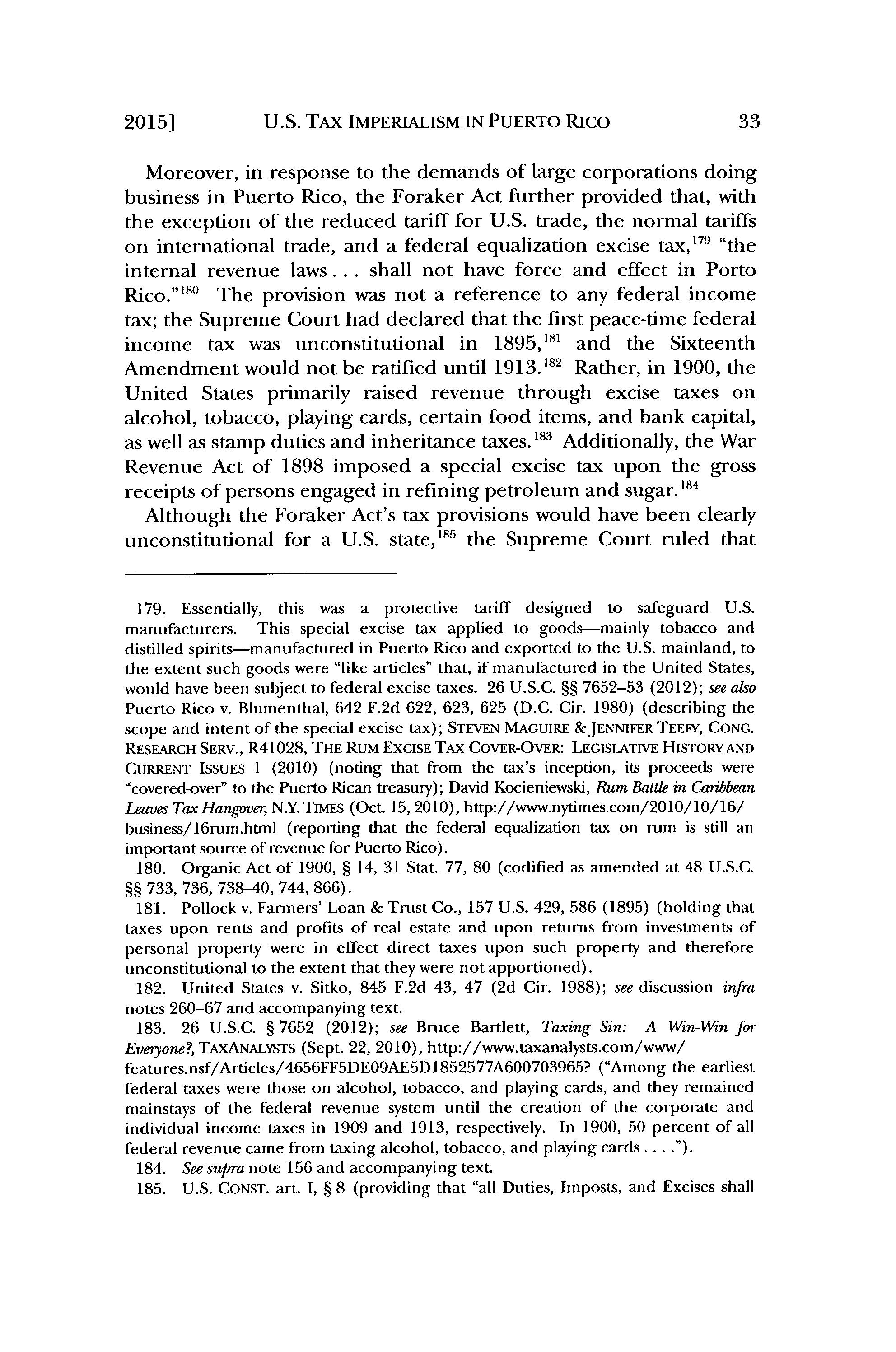
179. Essentially, this was a protective tariff designed to safeguard U.S. manufacturers. This special excise tax applied to goods-mainly tobacco and distilled spirits-manufactured in Puerto Rico and exported to the U.S. mainland, to the extent such goods were "like articles" that, if manufactured in the United States, would have been subject to federal excise taxes. 26 U.S.C. §§ 7652-53 (2012); see also Puerto Rico v. Blumenthal, 642 F.2d 622, 623, 625 (D.C. Cir. 1980) (describing the scope and intent of the special excise tax); STEVEN MAGUIRE &JENNIFERTEEFY, CONG. RESEARCH SERV., R41028, THE RUM ExcIsE TAX COVER-OVER: LEGISLATIVE HISTORYAND CURRENT ISSUES 1 (2010) (noting that from the tax's inception, its proceeds were "covered-over" to the Puerto Rican treasury); David Kocieniewski, Rum Battle in Caribbean Leaves Tax Hangover, N.Y. TIMEs (Oct. 15, 2010), http://www.nytimes.com/2010/10/16/ business/16rum.html (reporting that the federal equalization tax on rum is still an important source of revenue for Puerto Rico). 180. Organic Act of 1900, § 14, 31 Stat. 77, 80 (codified as amended at 48 U.S.C. §§ 733, 736, 738-40, 744, 866). 181. Pollock v. Farmers' Loan & Trust Co., 157 U.S. 429, 586 (1895) (holding that taxes upon rents and profits of real estate and upon returns from investments of personal property were in effect direct taxes upon such property and therefore unconstitutional to the extent that they were not apportioned). 182. United States v. Sitko, 845 F.2d 43, 47 (2d Cir. 1988); see discussion infra notes 260-67 and accompanying text. 183. 26 U.S.C. § 7652 (2012); see Bruce Bartlett, Taxing Sin: A Win-Win for Everyone?, TAxANALYSTs (Sept. 22, 2010), http://www.taxanalysts.com/www/ features.nsf/Articles/4656FF5DE9AE5DI852577A600703965? ("Among the earliest federal taxes were those on alcohol, tobacco, and playing cards, and they remained mainstays of the federal revenue system until the creation of the corporate and individual income taxes in 1909 and 1913, respectively. In 1900, 50 percent of all federal revenue came from taxing alcohol, tobacco, and playing cards. . 184. See supra note 156 and accompanying text. 185. U.S. CONsT. art. I, § 8 (providing that "all Duties, Imposts, and Excises shall
34
AMERICAN UNIVERSITY LAW REVIEW [Vol. 65:1
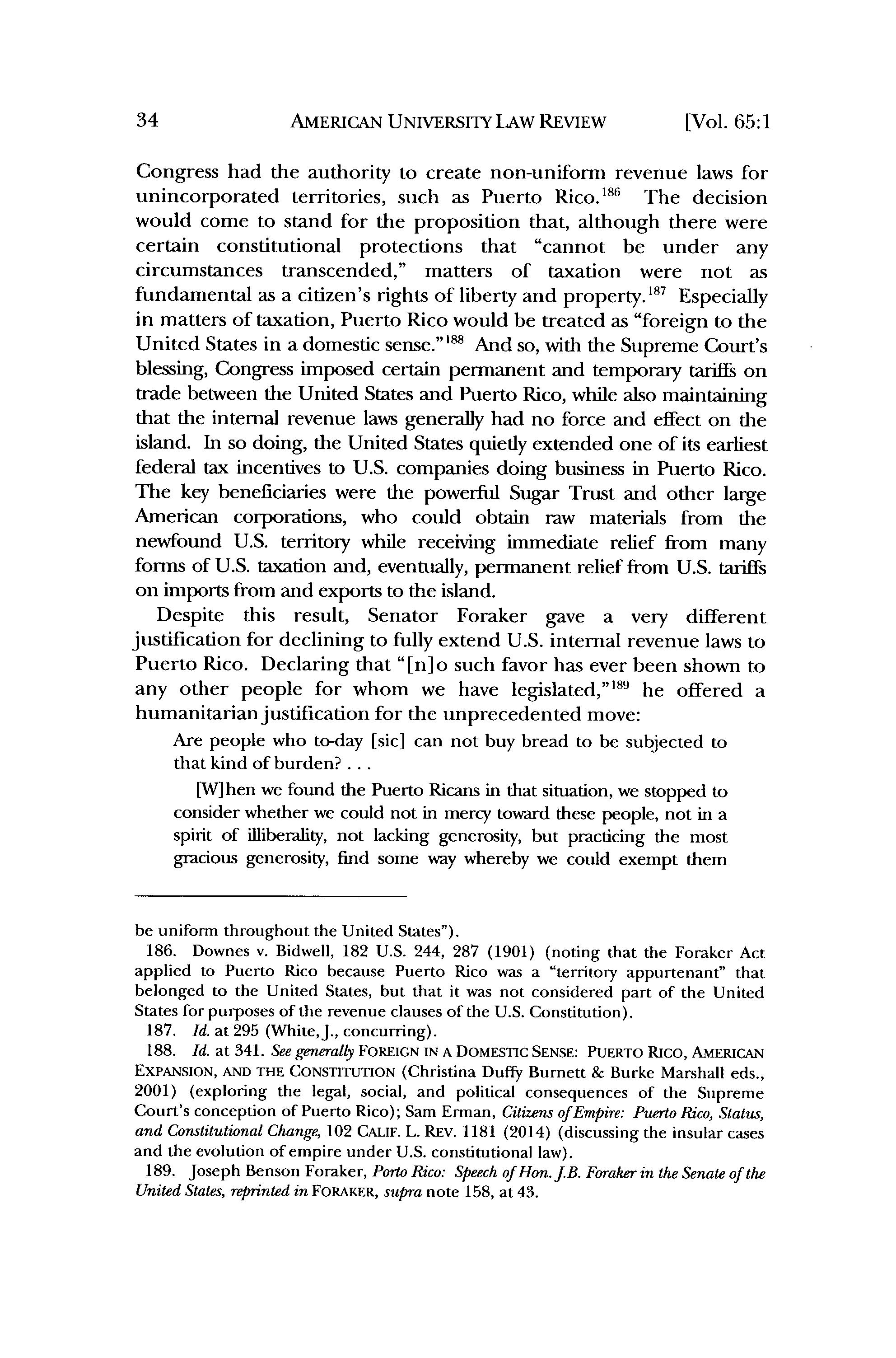
Congress had the authority to create non-uniform revenue laws for unincorporated territories, such as Puerto Rico.' The decision would come to stand for the proposition that, although there were certain constitutional protections that "cannot be under any circumstances transcended," matters of taxation were not as fundamental as a citizen's rights of liberty and property."' Especially in matters of taxation, Puerto Rico would be treated as "foreign to the United States in a domestic sense."'" And so, with the Supreme Court's blessing, Congress imposed certain permanent and temporary tariffs on trade between the United States and Puerto Rico, while also maintaining that the internal revenue laws generally had no force and effect on the island. In so doing, the United States quietly extended one of its earliest federal tax incentives to U.S. companies doing business in Puerto Rico. The key beneficiaries were the powerful Sugar Trust and other large American corporations, who could obtain raw materials from the newfound U.S. territory while receiving immediate relief from many forms of U.S. taxation and, eventually, permanent relief from U.S. tariffs on imports from and exports to the island.
Despite this result, Senator Foraker gave a very different justification for declining to fully extend U.S. internal revenue laws to Puerto Rico. Declaring that "[n]o such favor has ever been shown to any other people for whom we have legislated,"'" he offered a humanitarian justification for the unprecedented move:
Are people who to-day [sic] can not buy bread to be subjected to that kind of burden? ... [W] hen we found the Puerto Ricans in that situation, we stopped to consider whether we could not in mercy toward these people, not in a spirit of illiberality, not lacking generosity, but practicing the most gracious generosity, find some way whereby we could exempt them
be uniform throughout the United States"). 186. Downes v. Bidwell, 182 U.S. 244, 287 (1901) (noting that the Foraker Act applied to Puerto Rico because Puerto Rico was a "territory appurtenant" that belonged to the United States, but that it was not considered part of the United States for purposes of the revenue clauses of the U.S. Constitution). 187. Id. at 295 (White,J., concurring). 188. Id. at 341. See generally FOREIGN IN A DOMESTIC SENSE: PUERTO RIco, AMERICAN EXPANSION, AND THE CONSTITUTION (Christina Duffy Burnett & Burke Marshall eds., 2001) (exploring the legal, social, and political consequences of the Supreme Court's conception of Puerto Rico); Sam Erman, Citizens ofEmpire: Puerto Rico, Status, and Constitutional Change, 102 CALIF. L. REv. 1181 (2014) (discussing the insular cases and the evolution of empire under U.S. constitutional law). 189. Joseph Benson Foraker, Porto Rico: Speech ofHon.JB. Foraker in the Senate of the United States, reprinted in FORAKER, supra note 158, at 43.
2015]
U.S. TAX IMPERIALISM IN PUERTO RICO
35
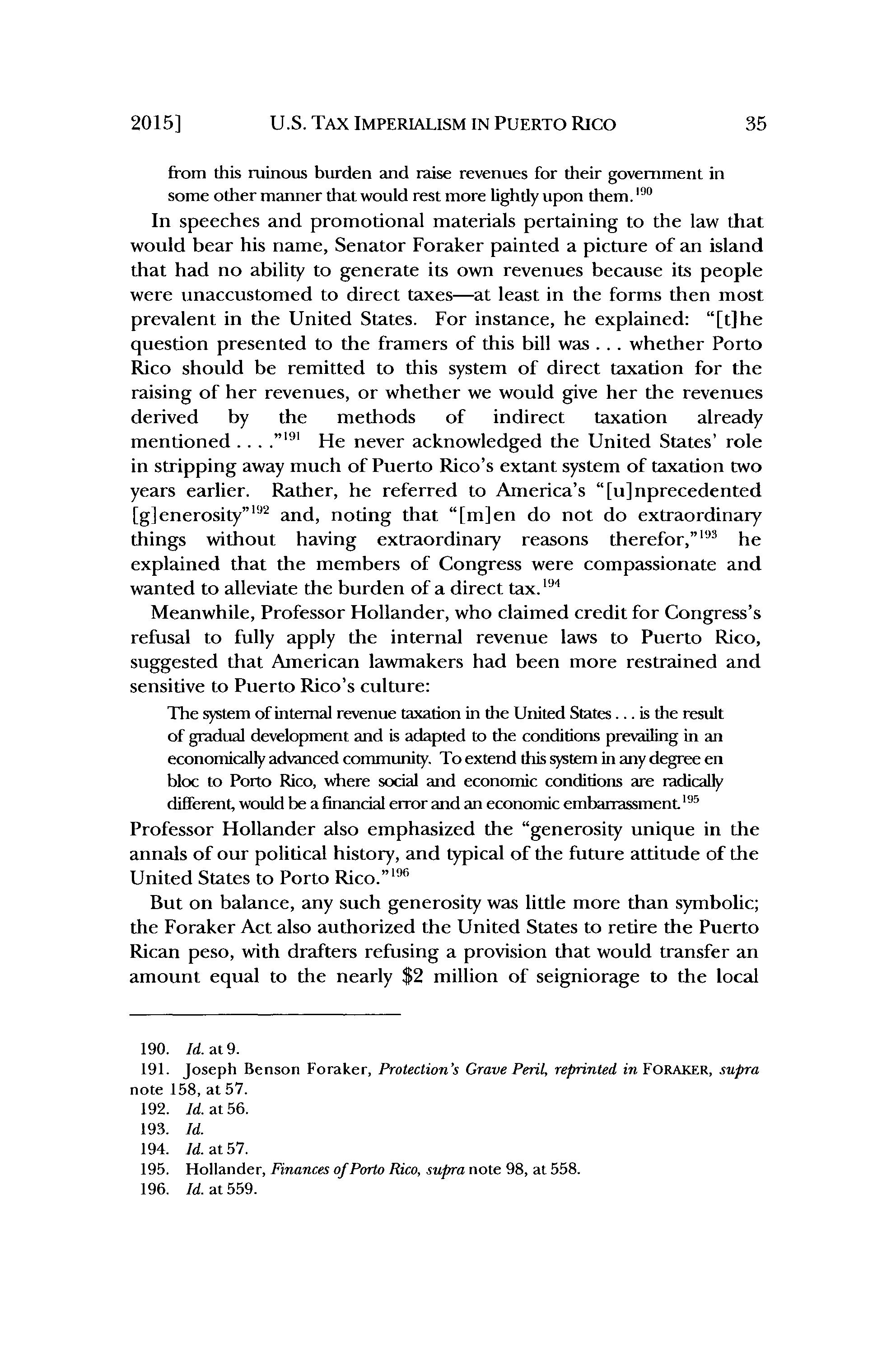
from this ruinous burden and raise revenues for their government in some other manner that would rest more lightly upon them.'o
In speeches and promotional materials pertaining to the law that would bear his name, Senator Foraker painted a picture of an island that had no ability to generate its own revenues because its people were unaccustomed to direct taxes-at least in the forms then most prevalent in the United States. For instance, he explained: "[t]he question presented to the framers of this bill was ... whether Porto Rico should be remitted to this system of direct taxation for the raising of her revenues, or whether we would give her the revenues derived by the methods of indirect taxation already mentioned.. . ."'9 ' He never acknowledged the United States' role in stripping away much of Puerto Rico's extant system of taxation two years earlier. Rather, he referred to America's "[u]nprecedented [glenerosity"'" and, noting that "[m]en do not do extraordinary things without having extraordinary reasons therefor,"'" he explained that the members of Congress were compassionate and wanted to alleviate the burden of a direct tax. 94
Meanwhile, Professor Hollander, who claimed credit for Congress's refusal to fully apply the internal revenue laws to Puerto Rico, suggested that American lawmakers had been more restrained and sensitive to Puerto Rico's culture:
The system of internal revenue taxation in the United States ... is the result of gradual development and is adapted to the conditions prevailing in an economically advanced community. To extend this system in any degree en bloc to Porto Rico, where social and economic conditions are radically different, would be a financial error and an economic embarrassment. I Professor Hollander also emphasized the "generosity unique in the annals of our political history, and typical of the future attitude of the United States to Porto Rico.""
But on balance, any such generosity was little more than symbolic; the Foraker Act also authorized the United States to retire the Puerto Rican peso, with drafters refusing a provision that would transfer an amount equal to the nearly $2 million of seigniorage to the local
190. Id. at 9. 191. Joseph Benson Foraker, Protection's Grave Peril, reprinted in FORAKER, supra note 158, at 57. 192. Id. at 56.
193. Id.
194. Id. at 57. 195. Hollander, Finances ofPorto Rico, supra note 98, at 558. 196. Id. at 559.
36
AMERICAN UNIVERSITY LAw REVIEw [Vol. 65:1
government." The new civil government's first governor would later acknowledge that the currency exchange caused "the circulating medium" to contract by forty percent and imposed a hardship upon the people.'" The Act further increased the costs of trade by requiring that Puerto Rican trade occur solely by American shipping lines.'" These and related facets of the legislation led Professor James Dietz to conclude that "[t]he Foraker Act was not simply a political document, ... it was also an economic instrument designed to control Puerto Rico's economic life." 0 o And, highlighting the precise economic interests that the United States sought to advance in Puerto Rico, following the passage of the Foraker Act in the spring of 1900, President McKinley appointed Charles Herbert Allen, a Massachusetts politician and founder of the American Sugar Refining Company, to serve as the first U.S.-appointed Governor of Puerto Rico.20
a. U.S. enforcement of tax laws in Puerto Rico
Following the establishment of the first civil government on May 1, 1900, a new insular revenue agency was formed to enforce Puerto Rican taxes. The agency initially focused its attention on enforcing the excise taxes on alcohol, tobacco, playing cards, and certain food items, which Puerto Ricans had largely evaded. As Professor Hollander explained, "it became the definite policy of the civil administration to enforce rigidly the excises as then existing, [with a goal of] developing such a degree of popular respect for insular revenue laws as to insure the prompt adoption and successful operation of a rational system of excise taxation. . . ."'02 The civil government dedicated its resources to field inspections, monitoring, and enforcement, employing an army of revenue officers, virtually all of whom had a background in military service.20 These efforts

197. See FORAKER, supra note 158, at 369-70 (including testimony relating to this aspect of the legislation). 198. Report of the Treasurer, supra note 108, at 65-66. 199. Organic Act of 1900, § 9, 31 Stat. 77, 79 (codified as amended 48 U.S.C. §§ 733, 736, 738-40, 744, 866); JAMES L. DIETZ, EcoNOMic HISTORY OF PUERTO Rico: INSUTUIONAL CHANGE AND CAPITAIIST DEVELOPMENT 89-90 (1986) (noting that "the U.S. merchant fleet was more expensive than that of other countries"). 200. DIETZ, supra note 199, at 89. 201. Henry Macfarland, Charles H. Allen, the First Governor of Puerto Rico, AM. MONTHLY REV. OF REVS. 563, 564 (1900) (stating that Allen initially wanted to decline the appointment, but accepted out of a sense of patriotic duty). 202. Hollander, Excise Taxation in Porto Rico, supra note 98, at 192. 203. Id. at 193-94; see also Report of the Treasurer (1907), supra note 90, at 177 (describing the military service background of internal revenue agents).
2015]
U.S. TAx IMPERIALISM IN PUERTO RICO
37
reflected a revenue collection trend that had been in place on the U.S. mainland since the 1880s: the increased enforcement of taxes, including through a "classic instrument of alien imposition-the bounty-to enforce their demands on the population."o2 1 Predictably, the civil government's enhancement of its revenue collecting powers encountered significant public backlash:
Contempt for the law pervaded every class of the population. The liquor-loving peasant in the rural districts sat up at night soaking the stamps off his bottle of rum to be stuck on the next bottle he bought; and the army officer in charge of the post canteen had [to] resort to the
United States District Court to test the propriety of denominating beer an alcoholic beverage.... In certain localities cancelled stamps indeed served as a minor circulating medium, available for re-use until worn to tatters .... Open defiance of the law was not unknown.
On several occasions internal revenue agents were mobbed; and in one notable instance two agents were severely clubbed and one of them put in jail."
Nonetheless, the civil government persisted in its efforts to bring Puerto Ricans into compliance with the laws, ultimately leading to improved enforcement and collection of tax liabilities. The internal revenue agents successfully increased the sale of stamps, and the Treasurer brought several hundred cases of possible fraud to the district courts.206
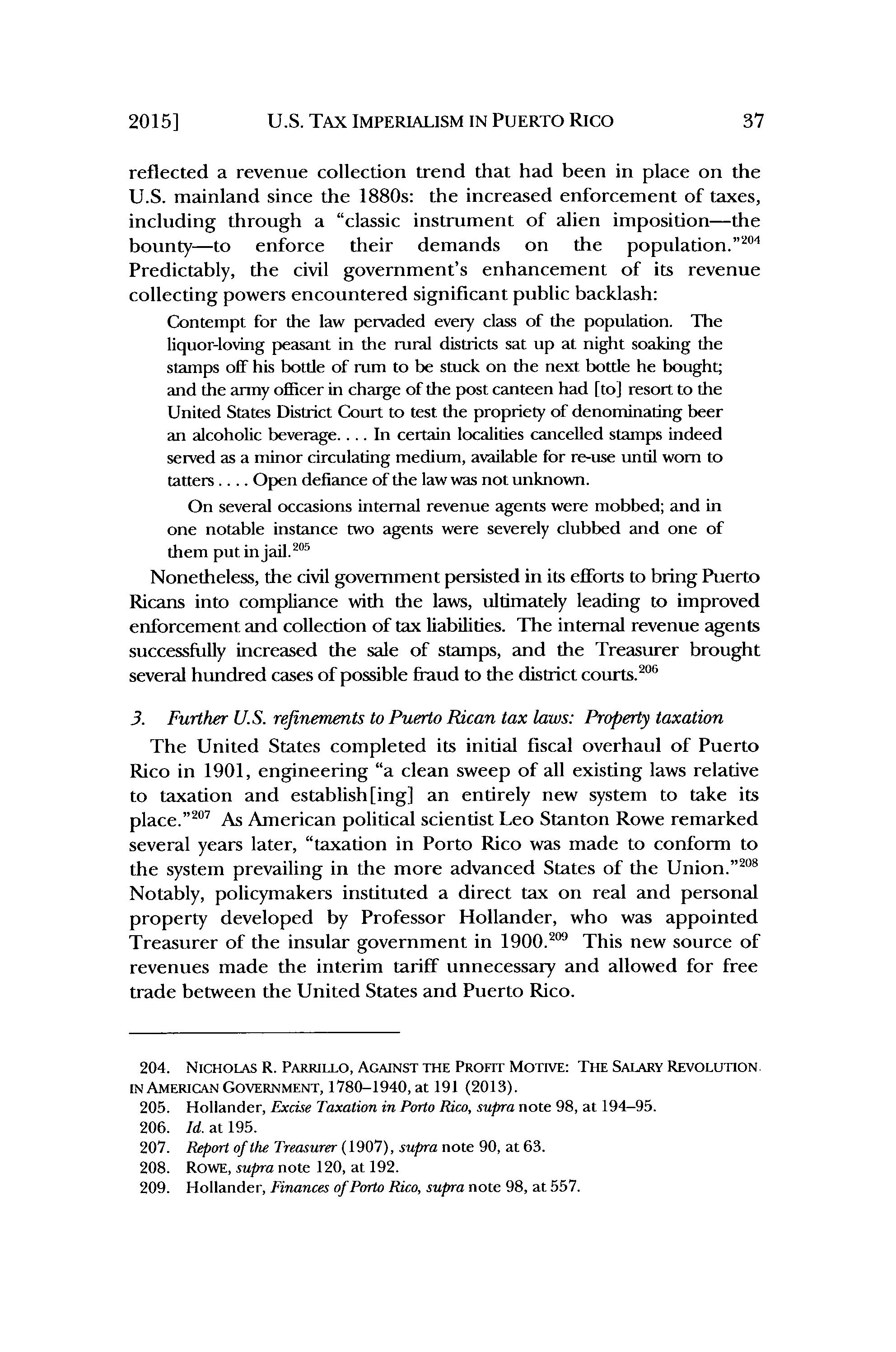
3.
Further U.S. refinements to Puerto Rican tax laws: Property taxation
The United States completed its initial fiscal overhaul of Puerto Rico in 1901, engineering "a clean sweep of all existing laws relative to taxation and establish[ing] an entirely new system to take its place.""o' As American political scientist Leo Stanton Rowe remarked several years later, "taxation in Porto Rico was made to conform to the system prevailing in the more advanced States of the Union."20 s Notably, policymakers instituted a direct tax on real and personal property developed by Professor Hollander, who was appointed Treasurer of the insular government in 1900.2' This new source of revenues made the interim tariff unnecessary and allowed for free trade between the United States and Puerto Rico.
204. NICHOLAs R. PARRILLO, AGAINST THE PROFIT MOTIVE: THE SALARY REVOLUTION. IN AMERICAN GOVERNMENT, 1780-1940, at 191 (2013). 205. Hollander, Excise Taxation in Porto Rico, supra note 98, at 194-95. 206. Id. at 195. 207. Report of the Treasurer (1907), supra note 90, at 63. 208. RowE, supra note 120, at 192. 209. Hollander, Finances ofPorto Rico, supra note 98, at 557.
38
AMERICAN UNIVERSITY LAW REVIEW [Vol. 65:1
As its centerpiece, the new system imposed a one percent tax upon the assessed value of real and personal property, which was subsequently reduced to one-half of one percent"'o following "a wave

of protests."211 The Hollander law also continued the highly unpopular excise taxes on liquor, tobacco, matches, and other goods; license taxes on merchants selling those goods; stamp taxes upon certain documents; an inheritance tax; a tax upon insurance and surety companies; and an annual twenty-five dollar license tax upon foreign corporations doing business in Puerto Rico.1 22 Governor Allen later remarked that these changes installed "a purely American system of taxation .. . to take the place of the old Spanish system that had been in vogue for over 300 years.""
The protests did not end following the reduction in the rate of property taxation. The entire concept of taxing the value of property-as opposed to the income it generated-was foreign to Puerto Ricans, leading many to oppose the law.' Puerto Rican landowners "claimed that the rate of taxation would ruin them."2 1 5 The loudest objections came from the island's elite classes, who called upon the federal government to annul the tax on the basis that it was "unfavorable to the commercial interests of the island." 216 Puerto Ricans especially resented that property assessments were made by a staff of centralized revenue agents hired and supervised by a U.S.-appointed treasurer. 2" These revenue agents were not shy
210. Porto Rican Legislation: Tax Rate Cut Down One-Half-Land Leased to French Railroad, N.Y. TIMES, Jan. 27, 1901. 211. AYAIA & BERNABE, supra note 1, at 37. 212. Report of the Treasurer (1907), supra note 90, at 63-64. 213. Gov. Allen Not to Resign: Will Remain in Porto Rico at the President's Request, N.Y. TIMEs, Apr. 7, 1901. 214. Porto Rico Tax Law to Stand: Government Unlikely to Heed Plea of Commissioners from Island, CHI. TRIB., Apr. 13, 1901 (reporting that "the landed aristocracy [did not] understand the American idea of taxing land," and, therefore, made objections to the President). 215. ROwE, supra note 120, at 195. 216. Make Appeal to Congress: Porto Ricans Want Hollander Revenue Law Nullied-Say it Is Against Their Interests, N.Y. TIMES, Feb. 4, 1901; see Reply to Gov. Allen: Commissioner Borda Declares Porto Rico Is Not Prosperous-The Revenue Law Condemned, N.Y. TIMES, Apr. 11, 1901 (articulating criticisms of the Hollander law); see also CARRAsQuaLo, supra note 102, at 48 ("Property owners across the island protested the bill, favoring the Spanish system as highly civilized and condemning the new one as hateful and abusive."). 217. See AYALA & BERNABE, supra note 1, at 37 (noting how the governor appointed assessors in Puerto Rico, which sparked protests, while elected municipal officials typically had this appointment power in the United States).
2015]
U.S. TAX IMPERIALISM IN PUERTO RICO
39
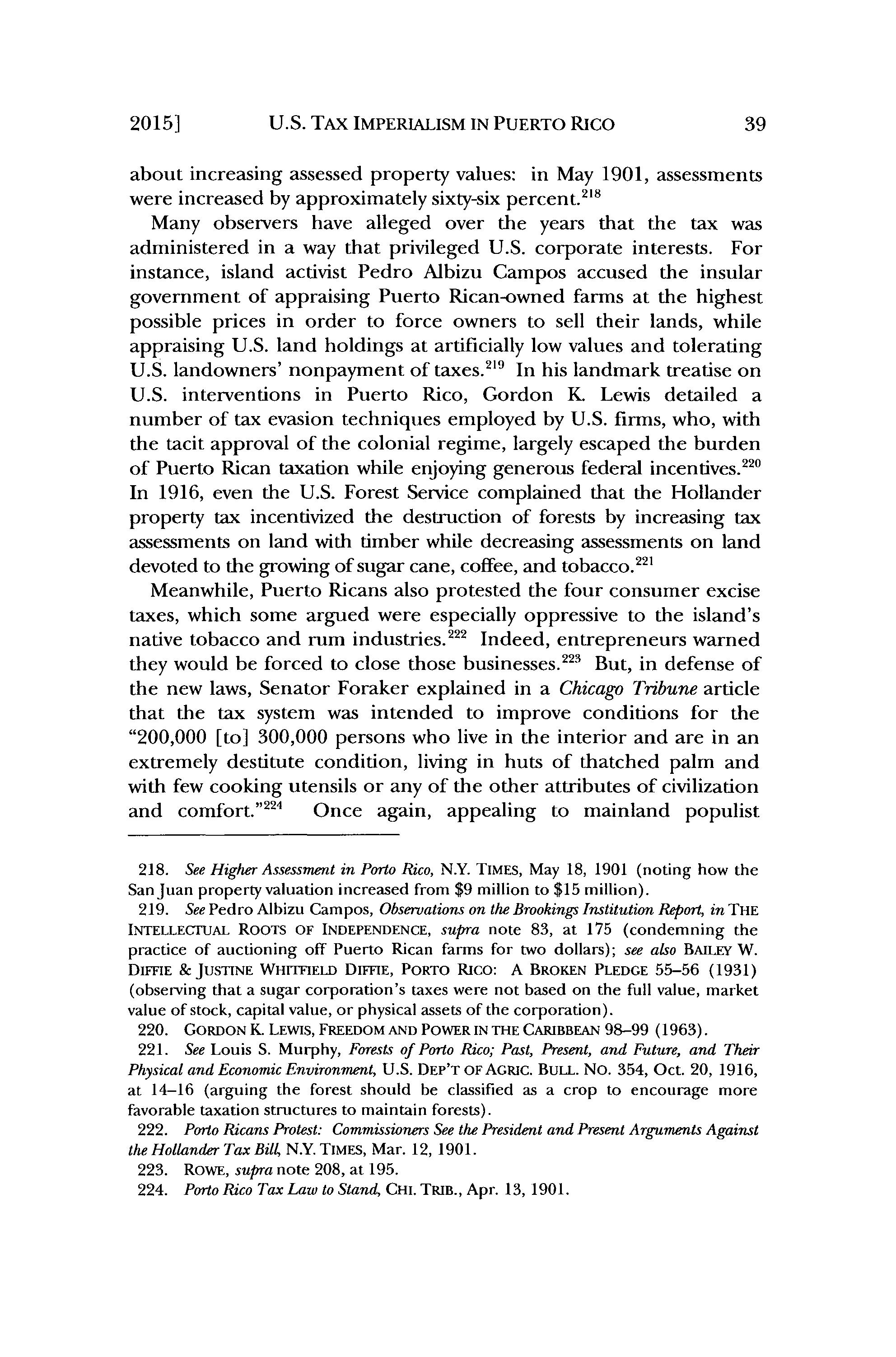
about increasing assessed property values: in May 1901, assessments were increased by approximately sixty-six percent.2
Many observers have alleged over the years that the tax was administered in a way that privileged U.S. corporate interests. For instance, island activist Pedro Albizu Campos accused the insular government of appraising Puerto Rican-owned farms at the highest possible prices in order to force owners to sell their lands, while appraising U.S. land holdings at artificially low values and tolerating U.S. landowners' nonpayment of taxes."' In his landmark treatise on U.S. interventions in Puerto Rico, Gordon K. Lewis detailed a number of tax evasion techniques employed by U.S. firms, who, with the tacit approval of the colonial regime, largely escaped the burden of Puerto Rican taxation while enjoying generous federal incentives.2 20 In 1916, even the U.S. Forest Service complained that the Hollander property tax incentivized the destruction of forests by increasing tax assessments on land with timber while decreasing assessments on land devoted to the growing of sugar cane, coffee, and tobacco.2 2
Meanwhile, Puerto Ricans also protested the four consumer excise taxes, which some argued were especially oppressive to the island's native tobacco and rum industries. 222 Indeed, entrepreneurs warned they would be forced to close those businesses. 2 But, in defense of the new laws, Senator Foraker explained in a Chicago Tribune article that the tax system was intended to improve conditions for the "200,000 [to] 300,000 persons who live in the interior and are in an extremely destitute condition, living in huts of thatched palm and with few cooking utensils or any of the other attributes of civilization and comfort." 2 2 Once again, appealing to mainland populist
218. See Higher Assessment in Porto Rico, N.Y. TIMES, May 18, 1901 (noting how the San Juan property valuation increased from $9 million to $15 million). 219. See Pedro Albizu Campos, Observations on the Brookings Institution Report, in THE INTELLECTUAL ROOTS OF INDEPENDENCE, supra note 83, at 175 (condemning the practice of auctioning off Puerto Rican farms for two dollars); see also BAILEY W.
DIFFIE & JUSTINE WHITFIELD DIFFIE, PORTO Rico: A BROKEN PLEDGE 55-56 (1931)
(observing that a sugar corporation's taxes were not based on the full value, market value of stock, capital value, or physical assets of the corporation).
220. GORDON K. LEWIS, FREEDOM AND POWER IN THE CARIBBEAN 98-99 (1963). 221. See Louis S. Murphy, Forests of Porto Rico; Past, Present, and Future, and Their Physical and Economic Environment, U.S. DEP'T OF AGRIc. BuLL. NO. 354, Oct. 20, 1916, at 14-16 (arguing the forest should be classified as a crop to encourage more favorable taxation structures to maintain forests). 222. Porto Ricans Protest: Commissioners See the President and Present Arguments Against the Hollander Tax Bil4 N.Y. TIMES, Mar. 12, 1901. 223. ROWE, supra note 208, at 195. 224. Porto Rico Tax Law to Stand, CHI. TRIB., Apr. 13, 1901.
40
AMERICAN UNIVERSITY LAW REVIEW [Vol. 65:1
sentiments, the article concluded that those Puerto Ricans who protested the new taxes were "aristocra[ts]."
Scholars have long debated whether the new property tax led to wide-scale foreclosure of small landowners' properties and a corresponding increase in land accumulation by large, absentee U.S. corporations." In 2007, sociologist C6sarJ. Ayala and professor and director of the Federico de Onis Hispanic Studies Center at the University of Puerto Rico Rafael Bernabe, observed that Governor Allen "was explicit about his intentions: 'I'd tax a little life into them. Every Portorican has a right to demand that every acre of rich sugar land should be developed, and I'd tax it until they had to put up or shut up.'"2 2 7 The authors concluded that "[h]igh assessments would force large landowners with idle lands to sell," while at the same time forcing "small property owners to enter the market economy, either as small producers or as wageworkers, in order to obtain dollars to pay the tax. "228 In 1996, Ayala similarly explained that: as a result of [the Hollander property tax], the peasantry polarized. The middle land owning sectors lost ground as land became concentrated into larger farms, at one extreme, and into ever smaller peasant plots on the other, as existing peasant plots were subdivided to heirs, creating a multiplication of farms too small for viable commercial exploitation.2 2 9 Moreover, through differentiation of the peasant expropriation, many peasants lost their lands. 230

economy and
But, in a separate empirical study, Ayala and his co-author Laird Bergad determined that the imposition of U.S.-style property taxation did not necessarily lead to more concentrated land tenure in Puerto Rico, in part because land holdings were already highly concentrated under Spanish rule.2 3 ' Given that Hollander's property tax exempted land valued at less than $100 from taxation, it would seem that the two positions can be reconciled. The subdivision of peasant plots might have offset the increased concentration of land holdings. Meanwhile, any increased concentration of land holdings was more
225. Id. 226. See Csar J. Ayala & Laird W. Bergad, Rural Puerto Rico in the Early Twentieth Century Reconsidered: Land and Society, 1899-1915, 37 LATIN AM. REs. REv. 65, 69-72 (2002) (observing land ownership "was highly concentrated well before 1898," and the Hollander tax actually led to the growth of small farms). 227. AYALA & BERNABE, supra note 1, at 37. 228. Id. at 37-38. 229. Csar J. Ayala, The Decline of the Plantation Economy and the Puerto Rican Migration of the 1950s, 7 LATINO STUD.J. 61, 62-63 (1996). 230. Id. 231. See Ayala & Bergad, supra note 226, at 72.
2015]
U.S. TAx IMPERIALISM IN PUERTO RICO 41
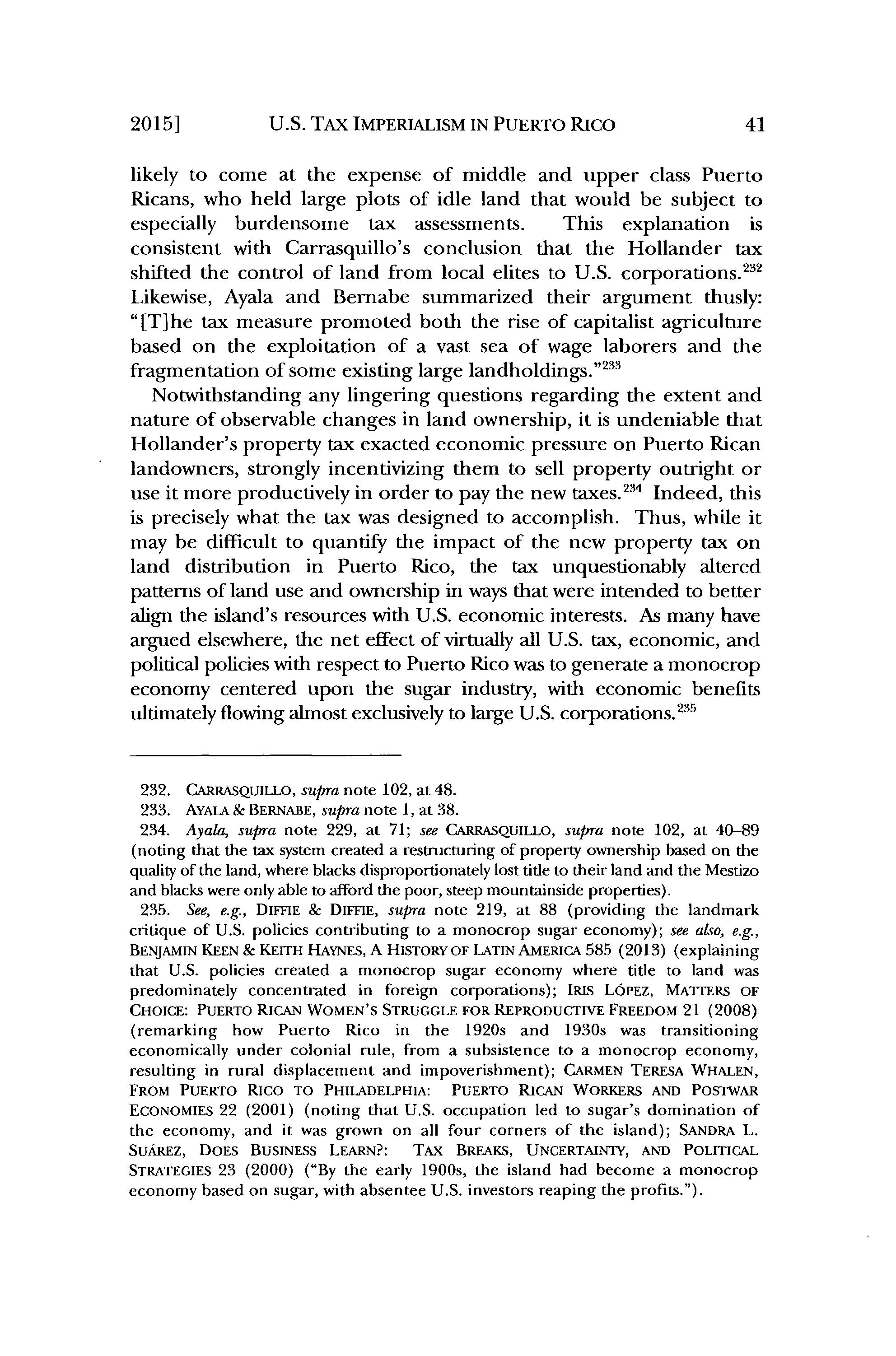
likely to come at the expense of middle and upper class Puerto Ricans, who held large plots of idle land that would be subject to especially burdensome tax assessments. This explanation is consistent with Carrasquillo's conclusion that the Hollander tax shifted the control of land from local elites to U.S. corporations.2 32 Likewise, Ayala and Bernabe summarized their argument thusly: "[T]he tax measure promoted both the rise of capitalist agriculture based on the exploitation of a vast sea of wage laborers and the fragmentation of some existing large landholdings."2 33
Notwithstanding any lingering questions regarding the extent and nature of observable changes in land ownership, it is undeniable that Hollander's property tax exacted economic pressure on Puerto Rican landowners, strongly incentivizing them to sell property outright or use it more productively in order to pay the new taxes.2 3 1 Indeed, this is precisely what the tax was designed to accomplish. Thus, while it may be difficult to quantify the impact of the new property tax on land distribution in Puerto Rico, the tax unquestionably altered patterns of land use and ownership in ways that were intended to better align the island's resources with U.S. economic interests. As many have argued elsewhere, the net effect of virtually all U.S. tax, economic, and political policies with respect to Puerto Rico was to generate a monocrop economy centered upon the sugar industry, with economic benefits ultimately flowing almost exclusively to large U.S. corporations.2 3 5
232. CARRASQUILLO, supra note 102, at 48. 233. AYALA & BERNABE, supra note 1, at 38. 234. Ayala, supra note 229, at 71; see CARRASQUILLO, supra note 102, at 40-89 (noting that the tax system created a restructuring of property ownership based on the quality of the land, where blacks disproportionately lost title to their land and the Mestizo and blacks were only able to afford the poor, steep mountainside properties). 235. See, e.g., DIFFIE & DIFFIE, supra note 219, at 88 (providing the landmark critique of U.S. policies contributing to a monocrop sugar economy); see also, e.g., BENJAMIN KEEN & KEITH HAYNES, A HISTORY OF LATIN AMERICA 585 (2013) (explaining that U.S. policies created a monocrop sugar economy where title to land was predominately concentrated in foreign corporations); IRIS L6PEZ, MATTERS OF CHOICE: PUERTO RICAN WOMEN'S STRUGGLE FOR REPRODUCTIVE FREEDOM 21 (2008) (remarking how Puerto Rico in the 1920s and 1930s was transitioning economically under colonial rule, from a subsistence to a monocrop economy, resulting in rural displacement and impoverishment); CARMEN TERESA WHALEN,
FROM PUERTO RICO TO PHILADELPHIA: PUERTO RICAN WORKERS AND POSTWAR
ECONOMIES 22 (2001) (noting that U.S. occupation led to sugar's domination of the economy, and it was grown on all four corners of the island); SANDRA L. SUAREz, DOES BUSINESS LEARN?: TAX BREAKS, UNCERTAINTY, AND POLITICAL STRATEGIES 23 (2000) ("By the early 1900s, the island had become a monocrop economy based on sugar, with absentee U.S. investors reaping the profits.").




